
69 minute read
Athletics
In light of the COVID-19 pandemic and after many discussions prioritizing community health, safety, and well-being, on July 15, the Founders League unanimously, and with great regret, canceled all Founders League interscholastic competition for the 2020 fall season.
Avon Old Farms still strongly believes in the value of athletics— physically, mentally, morally, and socially. The athletic directors created a robust and diverse program to make fall term after-school offerings exciting and beneficial to each student, further enhancing his Avon experience.
One advantage granted through the adjusted program was a decision at the New England level to allow varsity athletes to train and practice with their coaches outside the designated season: those who love hockey are training with John Gardner this fall; the baseball players who missed their spring season were able to come together in September, eliminating the possibility of a two-year gap in playing together.
For those who favor specializing in one sport, student athletes were able to practice their top choice sport this fall, taking players out of lower-level teams where they may not have been fully committed.
The athletic department thanks the parents and students who stood by Avon’s decisions and were excited about the plan we have in place. We’ve been making the best of a bad situation and were pleased to hear that a lot of students returned to campus excited about the opportunities to train and play.
Overall, though the athletic department faced many challenges this fall, we worked hard to ensure that nothing will keep students from experiencing the joy that competition can engender. We ensured that Avon athletes will remain conditioned and keep their competitive mindset so they will be prepared to succeed when the fields open again.
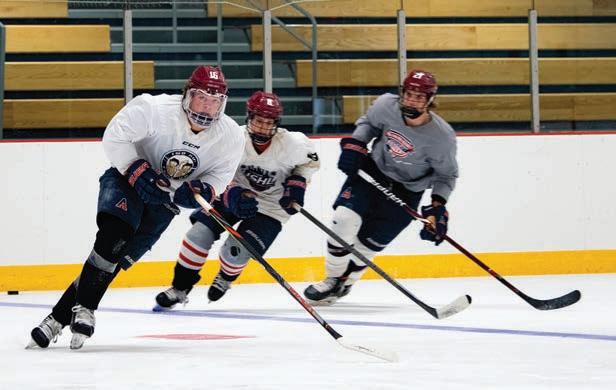
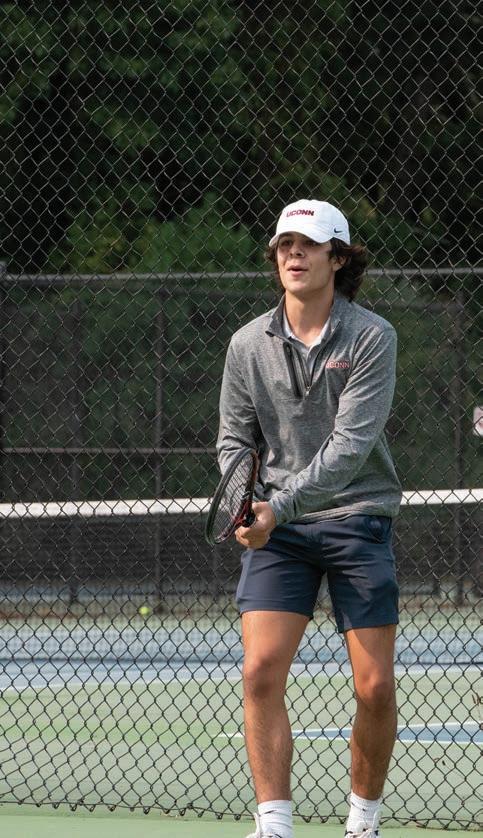
2020 FALL SEMESTER ATHLETIC OFFERINGS
• Acting and Production for TV/Film, Sports Media • Advanced Independent
Project Program • Baseball* • Basketball* • Cross Country/Trackand-Field • Fitness Training (Boxing,
General Fitness,
Swimming, Wrestling) • Football* • Golf
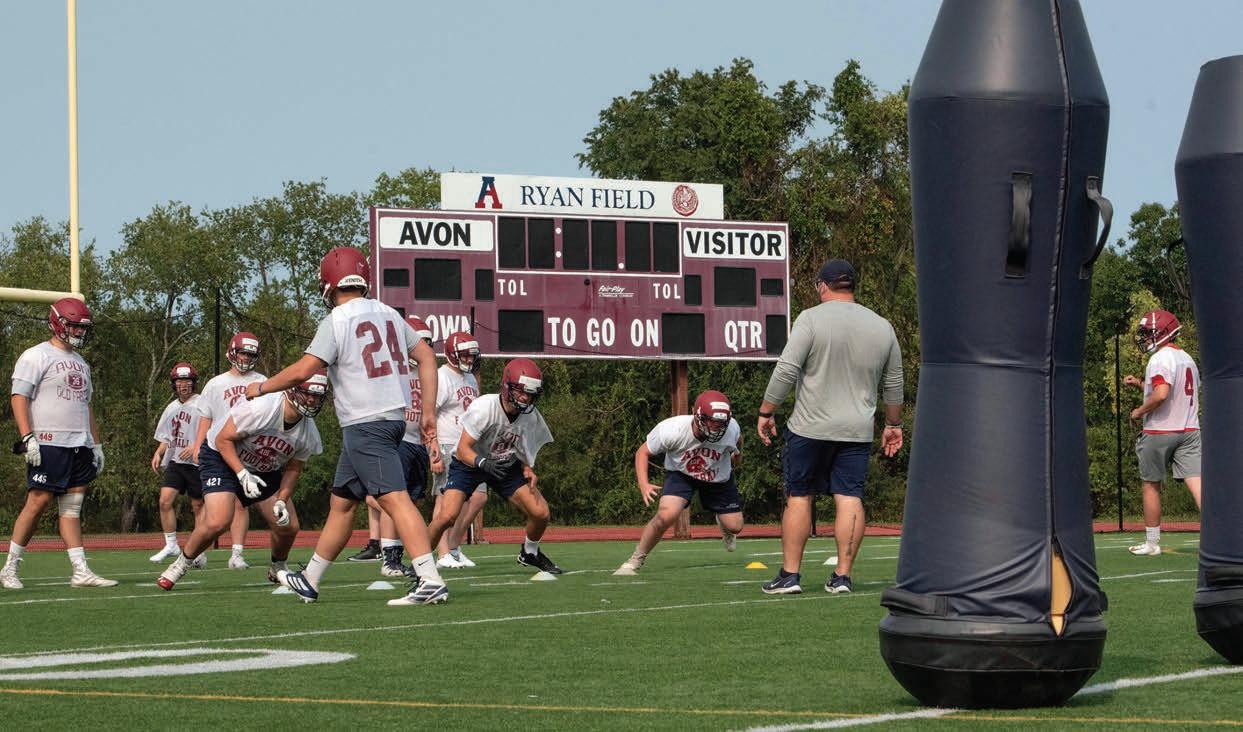
• Hockey* • Lacrosse* • Nimrod Project • Piano • Recreational Sports (Mountain
Biking, Rec Basketball, Rec
Soccer, Ultimate Frisbee) • Robotics • Soccer* • Squash* • Tennis* • Yearbook
* High intensity skill training
FIELD DAY 2020
Historically each year during the opening weekend of school, the student body heads down to the athletic fields to band together as brothers and compete for the coveted Field Day championship title and trophy. This year, the day full of field events was postponed to ensure that Avon would be able to guarantee safe participation in light of the COVID-19 pandemic. And so, on Saturday, September 19, Avonians had their Field Day, complete with a socially distant tire flip, stickball, volleyball, ultimate frisbee, Spikeball, Kan Jam, cornhole, golf, pull-ups, three-man tug-of-war, a 400-meter dash, and finally a 100-meter dash. In the end, the men of Diogenes Dormitory reigned victorious.
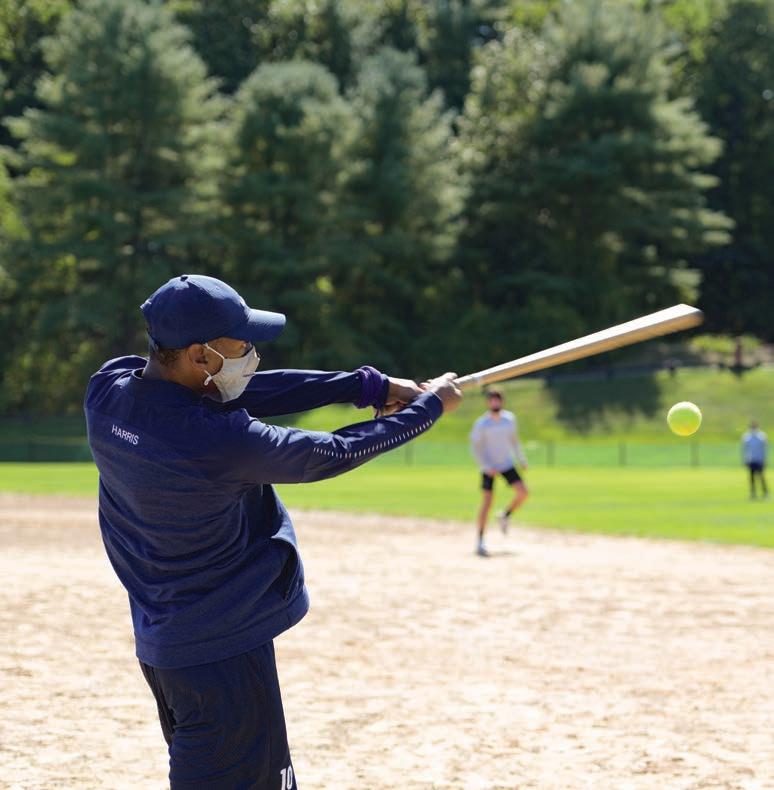
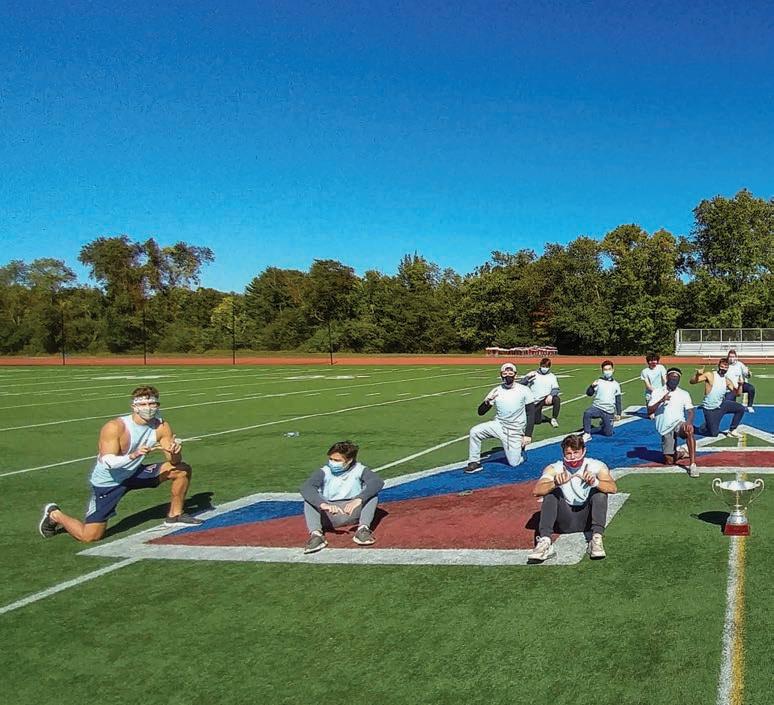
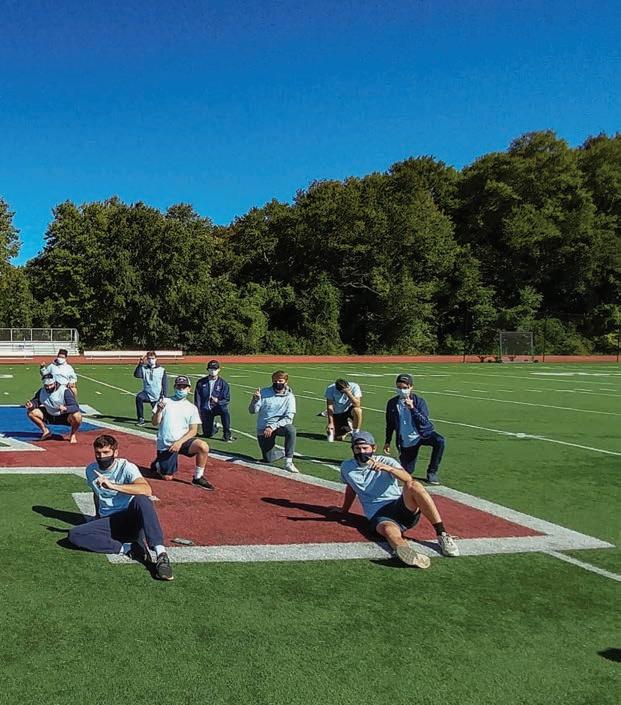
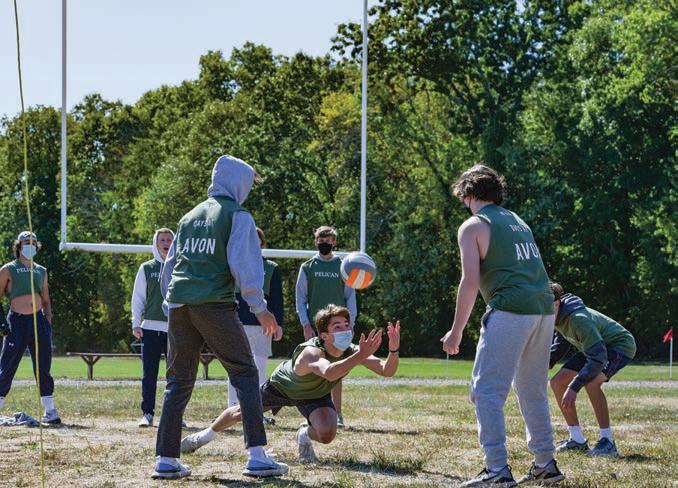
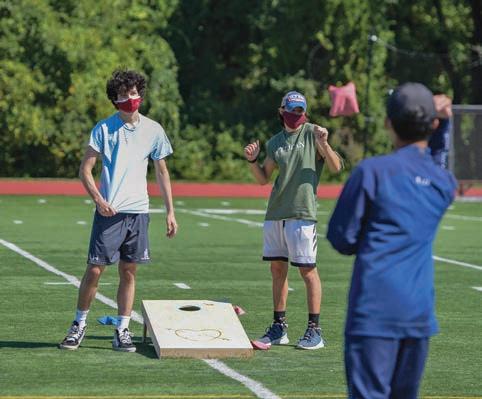
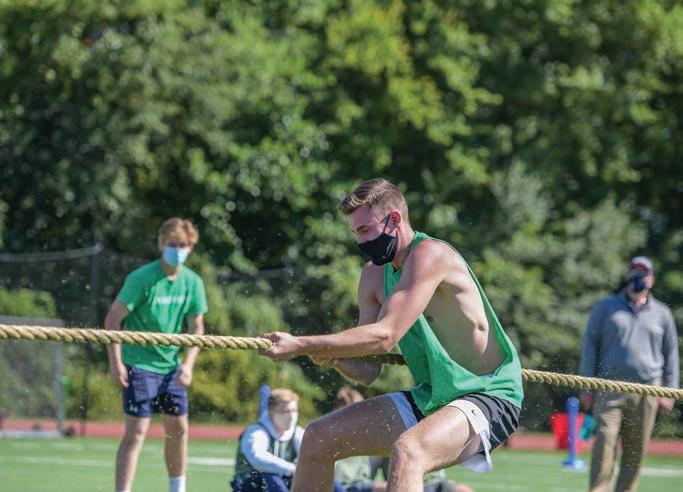
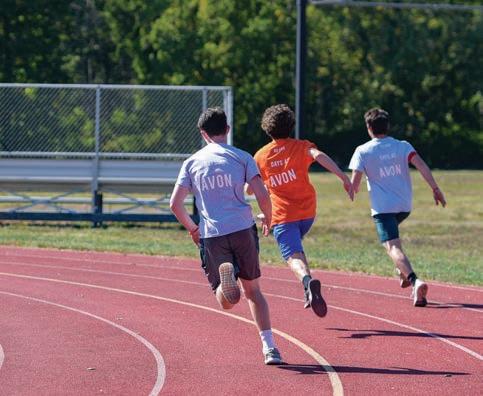
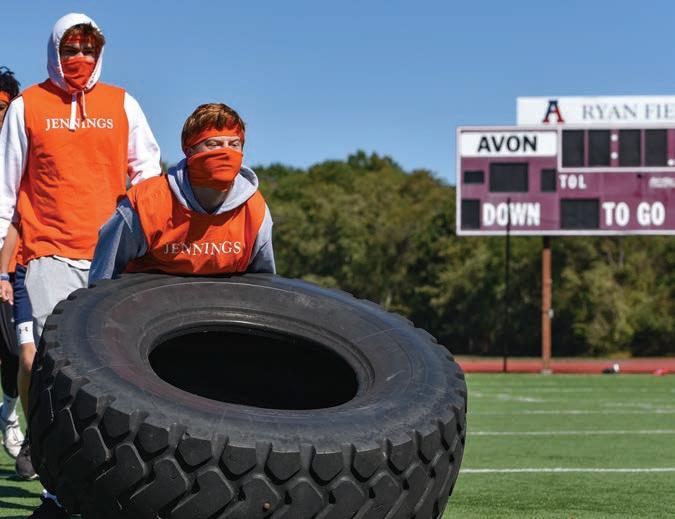
STUDENT SPOTLIGHT
John Zadrozny ’21
BY JACQUELINE KELLER
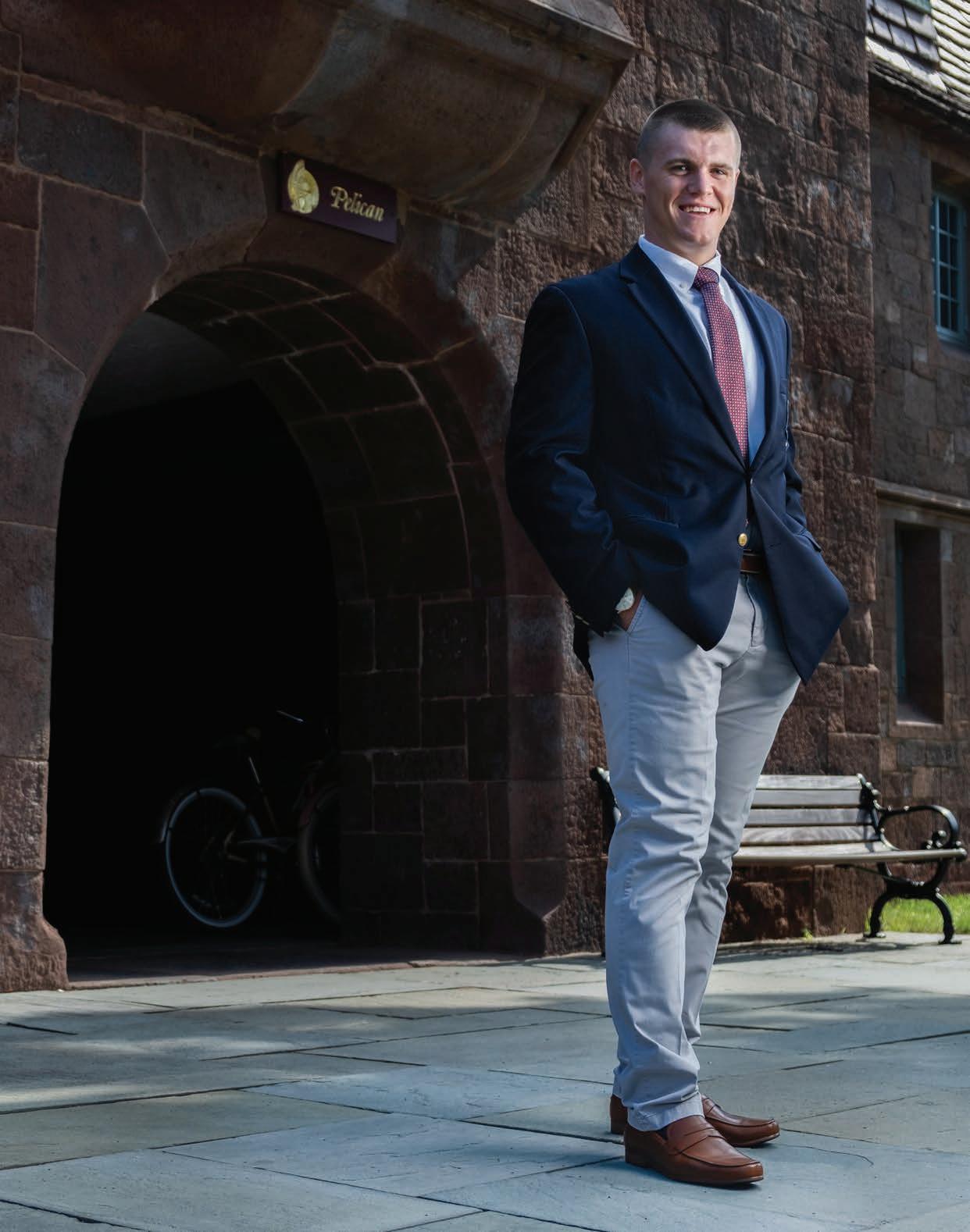
In the fall of 2017, John Zadrozny ’21 followed his dreams to Avon Old Farms and has not looked back since. What began as a passion for baseball blossomed into a full-blown renaissance-man experience, thanks to the magic that is Mrs. Riddle’s Village.
“My family is a real baseball family,” John explains. “We’ve spent every summer on Cape Cod watching the Cape Cod League. Games are on small high-school fields, so I could interact with the college players. Whenever I said I was from Glastonbury, the players responded with, ‘Is that near Avon Old Farms?’ Players from Oregon, Texas, California … they all knew Avon Old Farms baseball. That’s how, as a fifth grader, I decided I needed to get to Avon.”
John began to talk more and more about Avon. One day, his father received a large order at his pizza shop to be delivered to the Avon Old Farms athletic fields. “My dad pulled me out of school and said, ‘You want to see Avon, right? Well, now’s your chance. Come help me with a delivery.’”
They arrived at Avon’s Ryan Field where football practice was still ongoing. John and his father sat down to watch the end of practice when Coach Kevin Driscoll approached them. “We explained why we were there and mentioned that we knew Jalen Ollie ’15, Avon’s quarterback. When we said we knew him, we meant that we knew he was a guy from Glastonbury attending Avon; we weren’t best friends with the family. But Coach Driscoll called him over, and we stood there talking for a good 45 minutes. Jalen and Coach Driscoll were so generous with their time and happy to tell me all about the school that it deepened my desire to come here.”
John’s parents told him he would need to get straight A’s from that day forward for them to consider a boarding school education—and he did. Upon entering eighth grade, he even filled out the Avon Old Farms admissions application, taking it to his parents to sign and submit. “Though baseball got me the name, and the football team gave me my first welcome, it was everything else about Avon that drew me in: the academics, the boarding experience, the drama program, the music. The whole package of what Avon stood for spoke to me.”
John was eager to begin his Avon experience and jumped right in: it was the first time his schedule allowed him to do it all. That fall, John won a leading role in the Old Farms Theater Company’s production of Rope, in which he played Brandon Shaw. That winter, John was the sole freshman representative elected to the Student Council. In the spring, he played baseball.
“Baseball built my leadership skills, and theater raised my voice. On the Student Council, those things came together to help me share my values and desires with my peers. It all worked together,” he says. “I moved in during new student orientation, and I didn’t go home again until Thanksgiving. Don’t get me wrong—I called my parents every night—but I was so happy that I never got homesick. Avon was exactly where I wanted to be.”
Over his Avon career, he has led the Big Brother program and Student Activities and continues to be involved in Avon Outreach and the Riddlers. For John, it’s important to
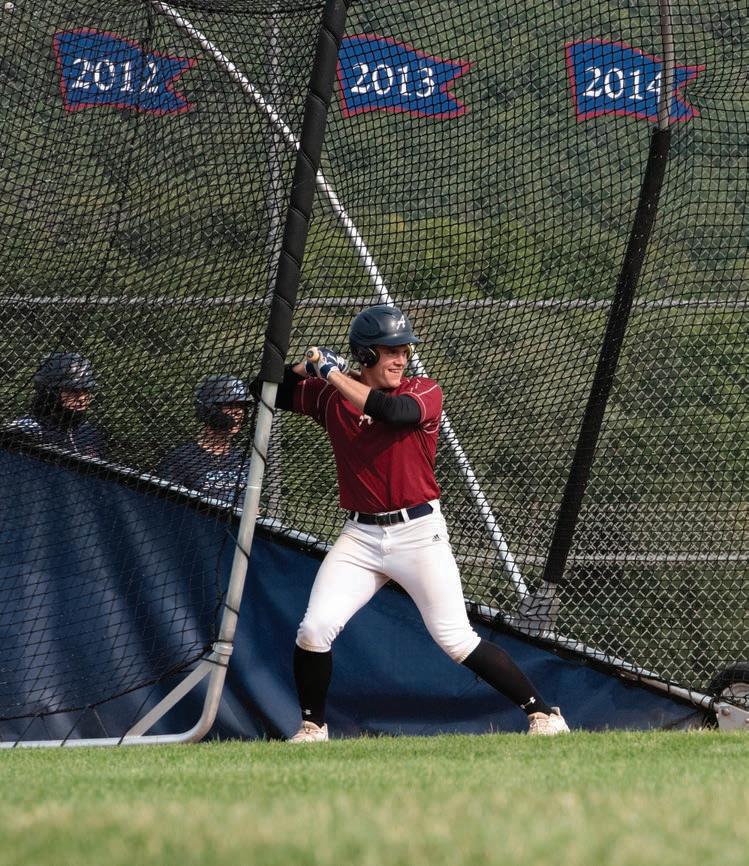
stay involved in the community and volunteer to give back, another reason why it’s clear to see why he was voted as this year’s warden.
“Inside Avon Old Farms and out, it is important to help those in need,” he says. “Without financial aid, I would not be able to enjoy an Avon education, and I want to give back to a school that has gifted me with so much. Beyond Avon, it’s important to be reminded of the struggles people encounter daily. Volunteering does that.”
Along the way, John set a strong academic example. He created a solid routine and began to take advantage of the facilities. “I would go to the gym in the morning, and I loved having access to the library to get some quiet work in anytime it fit my schedule. I learned to take advantage of the enrichment hour and found teachers for extra help.”
He thanks his freshman and sophomore advisor, Daniel Hodgson, for helping him settle in and for being a great coach and also expresses gratitude to his junior and senior advisor, Robert Whitty, for helping him when he struggled with courses and for creating a plan to succeed. He notes Michael Symes’s energy when running Pelican Dormitory and took his saying “No bad days at Avon” to heart. Most of all, he is thankful to Samantha Jensen for being his steady support at Avon. “My mom knows I call Mrs. Jensen my Avon mom,” he jokes. “I get along
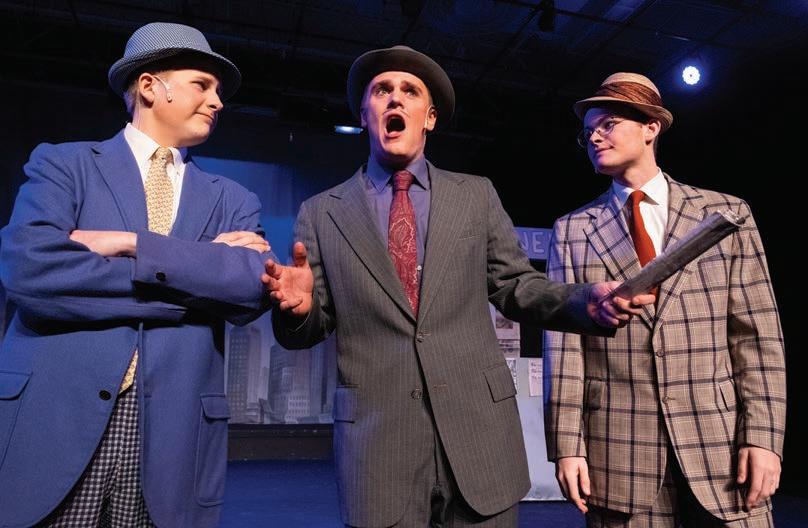
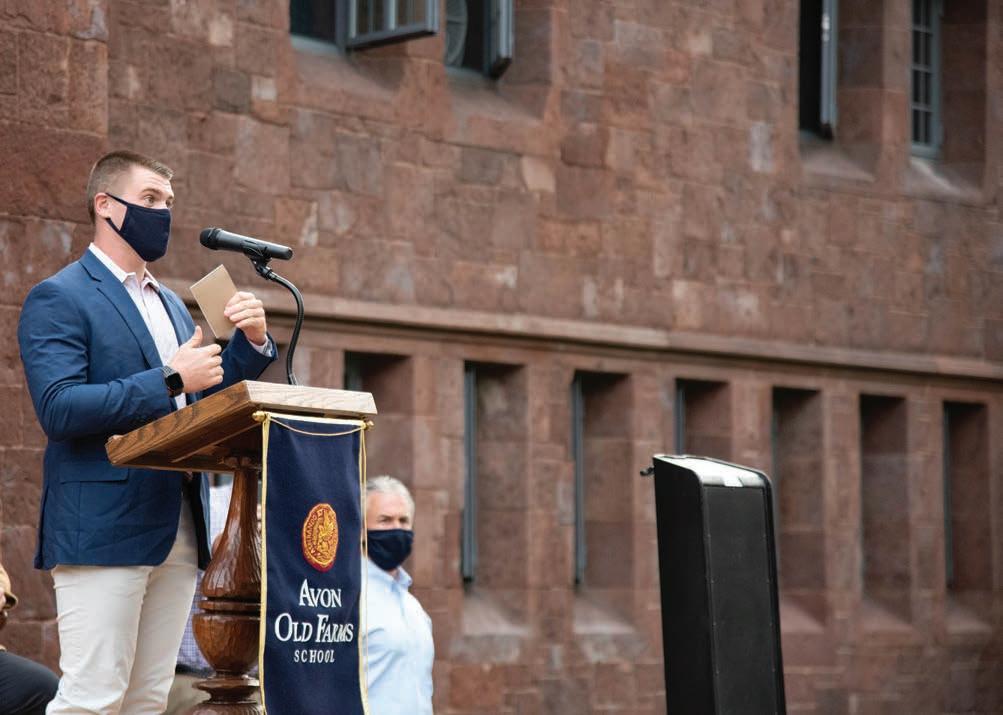
with her so well. All her sons were Avonians involved in drama, so that started our connection. Then when she reinvigorated the Big Brother program and I got involved, our bond strengthened. She’s always there, whatever you need, no matter what.”
With a strong support system behind him and a solid character established before coming into Avon, it is easy to see how John excelled and grew to fit the role of warden this year.
“The first time I met John, he was in the Field House working on his pitching arm,” recalls Jensen, director of the Bigelow Learning Center. “I was with another teacher and neither of us had seen him around campus yet. He introduced himself to us both, shook our hands, and flashed the signature Zadrozny smile. I asked if he was a PG, to which he replied, ‘No, ma’am. I’m a freshman.’ Imagine how impressed we were. John is a steadfast, upstanding young man. He always has good ideas, he is willing to work with the group, and his love for Avon is always apparent.”
John was most excited at the prospect of getting everyone back on campus this fall, but he understood the external factors that would make his senior year different than most. He took on the challenge of keeping spirits high, and when the dorm monitors moved in, he was eager to hit the ground running.
Though a lot remains unknown about what the spring semester and beyond may hold for him, John hopes his baseball career will continue into college. He plans to study political science or possibly apply to pre-law. “I’d like to perform at the highest academic level as well as the highest athletic level. I believe Avon has prepared me for the next step.”
Along those lines, this year he’s packing his schedule with collegelike courses: AP U.S. Government, English IV Honors, AP Environmental Science, Spanish V Honors, and one new course taught by Head of School Jim Detora: Leadership, Problem Solving, and Calculus.
“We started Avon as a group of 67 boys in the fall of 2017; today our class has grown to 116. Within those relationships, there’s nothing like being back with the boys, on campus; being together at Avon is the x factor. My goal this year as warden is to maintain our sense of identity as Avonians, regardless of what the school year looks like.”
With that type of mentality in our student body leader, we have no doubt that challenge will be met.
A TRIBUTE TO George M. Trautman
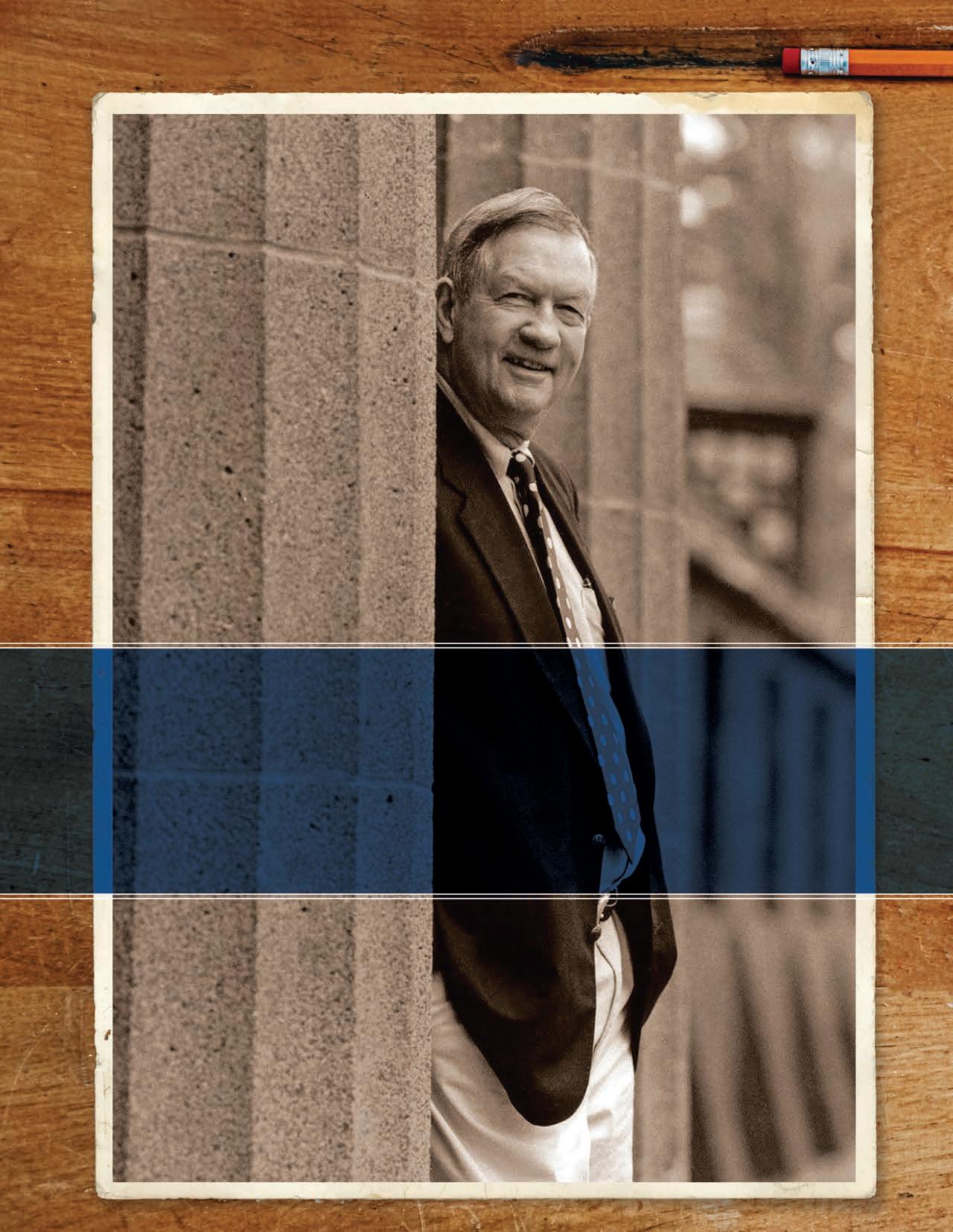
1933–2020
Beloved former headmaster George M. Trautman passed away on June 29, 2020, at the age of 87. Shocked by the news, much of the Avon Old Farms community struggled with the loss of a pillar of our school. The inability to hold a gathering ceremony on our campus this summer because of the pandemic heightened the sense of feeling adrift in the wake of this sadness, but several Avonians who knew George best share their memories of him in these pages.
The story of George’s life became entwined with the story of Avon Old Farms School when he arrived in 1969. In the late 1980s, after nearly two decades of brilliant leadership at Avon Old Farms, George was recognized by other heads of school as one of our nation’s greatest headmasters. At that time, Peter M. Evans H’18, P’98 was asked to tell George’s unfolding story as he continued to lay the foundation for the best school for boys in the United States. Because so many Avonians do not know the details of that story, we begin our tribute to George by sharing it here.
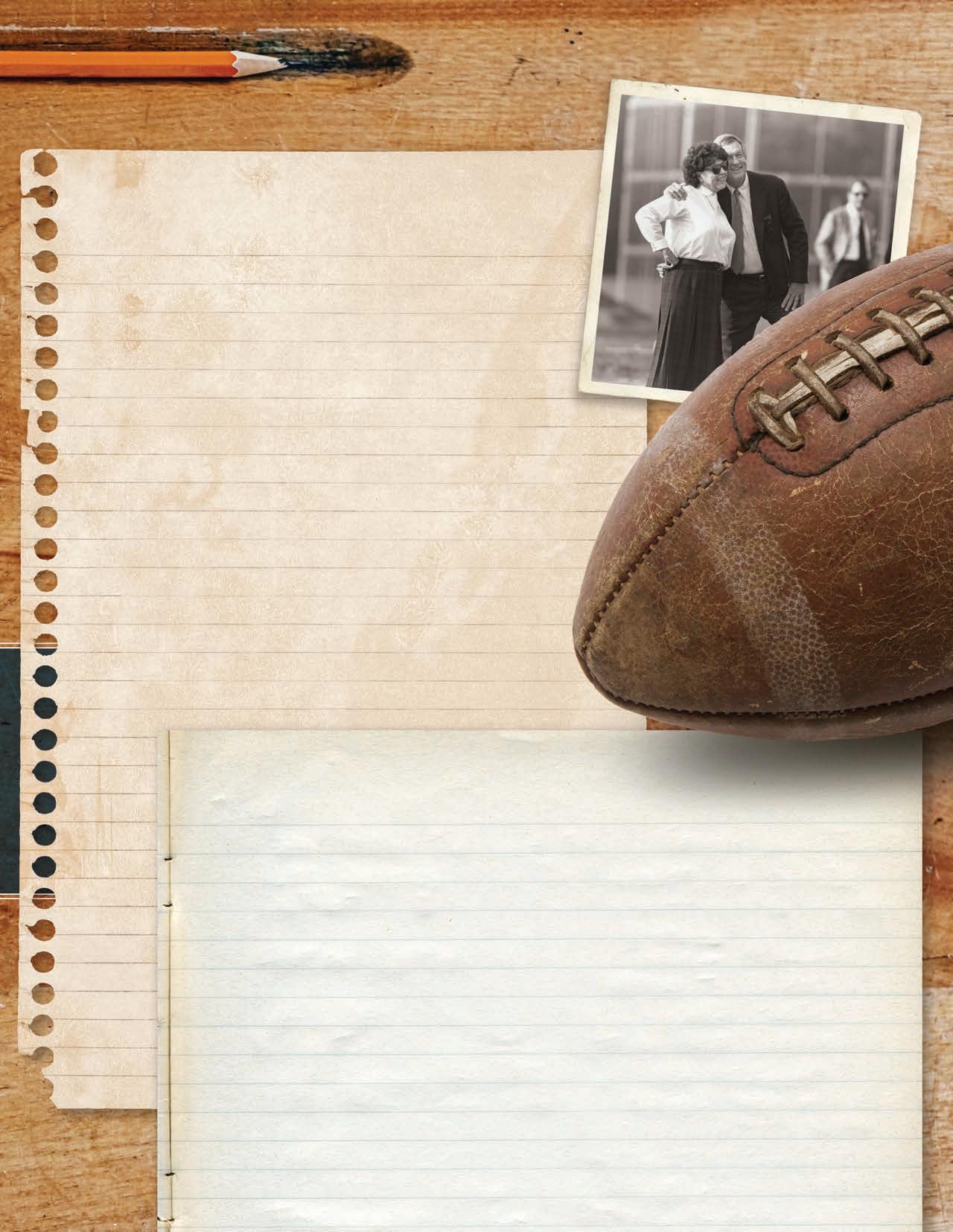
THE MAN AND HIS SCHOOL
BY PETER M. EVANS H’18, P’98
You can’t talk about a dedicated architect without talking about what he builds—because he is part of it, and it is part of him.
Born and raised in Baltimore, a graduate of St. Paul’s School there, George Trautman attended the University of Pennsylvania where he left his mark on both the football and lacrosse fields—All-East and All-Ivy as a linebacker in football and All-American as a center midfielder in lacrosse. In investigating his past, one is drawn to certain conspicuously consistent threads. He was a tough man, an indefatigable competitor, a winner—always. George’s capacity for hard work, his dedication, and his propensity for embracing responsibility coupled with his relentless pursuit of worthy goals generated a continuous source of energy and growth in him and those around him. George inspired; when he reached, those around him reached. George was the self-made man writ large. He instinctively worshipped at the altar of common sense in dealing with life’s ever-changing puzzles but managed to meld an ingenious blend of rigidity in his adherence to fundamental principles with resiliency
in their practical application to unique and complex problems. Supremely confident in where he was going and what was right, George nonetheless always maintained a remarkable capacity to listen to and learn from others. He knew people, and, more important, he knew himself. If the measure of a leader is in the fruits of his labor and the devotion of his following, then George was a leader par excellence.
At the age of 21, George began his career in education at Tabor Academy, in Marion, Mass., where he taught history and coached football and lacrosse. He quickly gravitated to positions of responsibility and authority, running a major dormitory and the dining hall and becoming an operative force in the area of discipline. He was appointed director of summer school. In all areas, he ran a tight ship, made decisions, and solved problems. He gained a reputation for firmness and fairness that often translated into considerable difficulty for those who overstepped established, well-defined boundaries of propriety. It was said that you always knew where you stood with George. If there was any doubt, he certainly did not hesitate to tell you. He inherited the nickname “Nails,” which was heralded with respect, admiration, or trepidation depending upon one’s situational relationship with him. George learned much during those formative years at Tabor: put in the most definitive terms, the headmaster must run the school. In 1969, Avon Old Farms desperately needed such a headmaster. In August 1969, the newly appointed
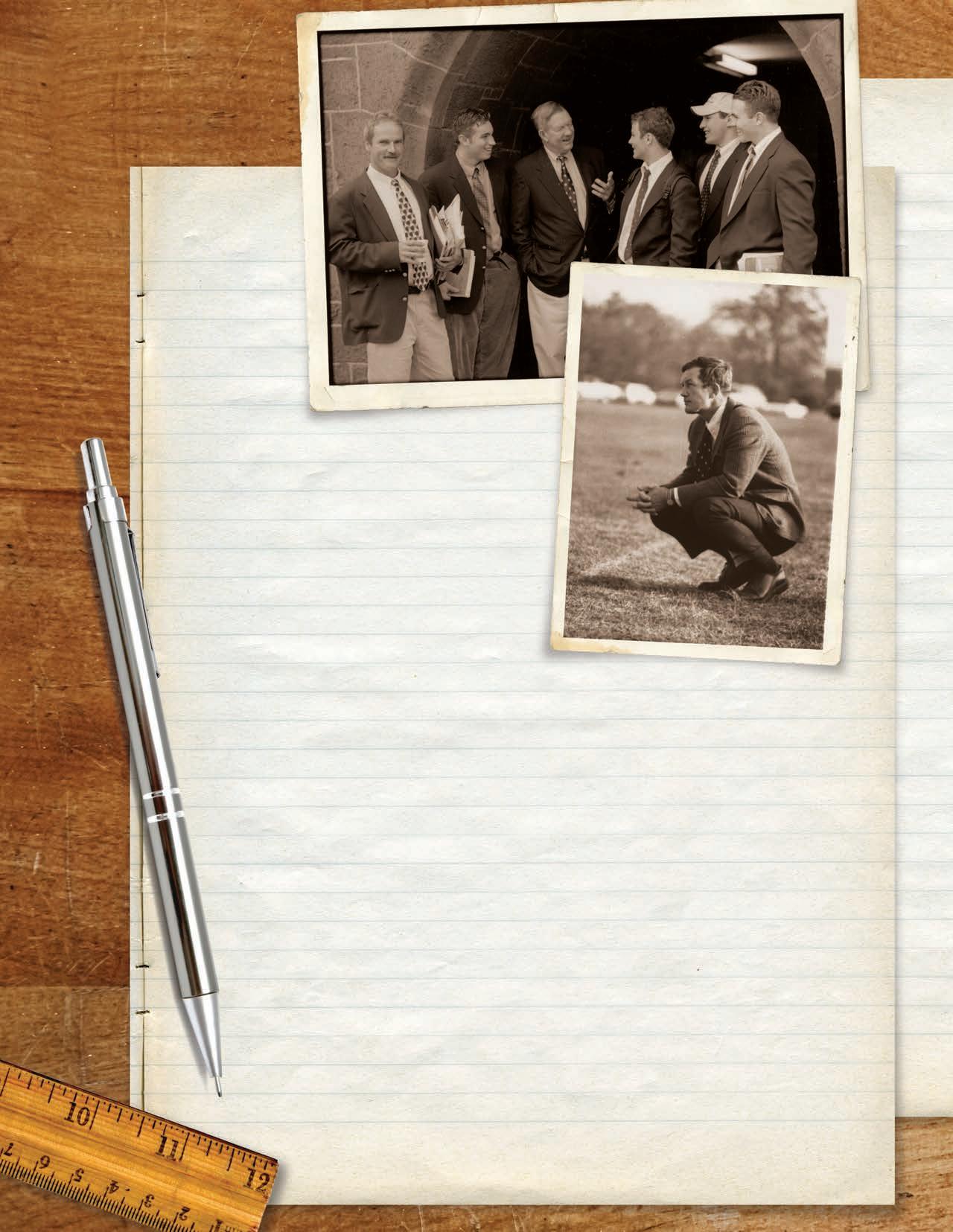
headmaster took up residence in the quiet Cotswolds-inspired village of Avon Old Farms. At 36, George Trautman was resolute, bold, and braced for a campaign. The campus was physically magnificent—the school, however, was in trouble: empty beds, red ink, deferred maintenance, and philosophical drift since the death of its former headmaster, Don Pierpont, a year earlier. In firmly binding his future and destiny to that of a floundering vessel, George consciously undertook a do-or-die challenge. What was the mettle of this man? From the moment of his arrival, Avon became a school committed to a kind of institutional dynamism. George began his tenure relying on basic educational premises from which he never deviated: keep the boys busy, productively occupied. They will learn much, make progress, and become sturdy citizens. Directed change was perceivable in every nook and cranny of school life: philosophy, curriculum, athletics, facilities, admissions,
college placement, and atmosphere. The headmaster was omnipresent. In the trenches with the faculty and the boys, his guiding hand touched all. The fundamental formula was simple and as unshakeable as a school constructed in stone and oak: work hard. George was at once the architect and the exemplar. Caring requires commitment and time, he suggested. To teach, one must spend time with the boys—in the classroom, on the athletic fields, in the dormitories, and elsewhere. He felt strongly about and vigorously supported athletics because athletics provides training for life: its purpose is to promote the development of the well-rounded, self-confident young man who knows how to work effectively with others. George also promoted an ever-expanding academic curriculum while laying the foundation for outstanding programs in the arts—visual, performing, and musical. Education of the whole boy was the goal in all of this. During the decades of his tenure, the school evolved. The architect was busy. He surrounded himself with a capable and supportive administration and faculty. Enrollment doubled. College placement expanded. Admissions exploded. The curriculum matured. The teams did well. Facilities were added: a new library, an auditorium theater, a hockey rink, two new dormitories, a new art/music center, and more. Pride burgeoned. Whether described as a sense of community or an extended family, Avon Old Farms successfully created a humanistic environment and thus a very effective school—one that had an enduring impact on all those who worked within and contributed to the fabric. The bottom line was caring, and behind it all was the architect, George Trautman.
George Trautman was the ‘ultimate difference maker’ for our school and the people in it, students and faculty alike. Looking back through the lens of my 47 years at Avon Old Farms, I cannot imagine another headmaster in this century having a greater impact on a school in the process of defining itself than George. At this solemn time of reflection, our hearts go out to George’s family—his loving and supportive wife, Barbara; his sons, Tim and Courtney; and his daughter, Emily.
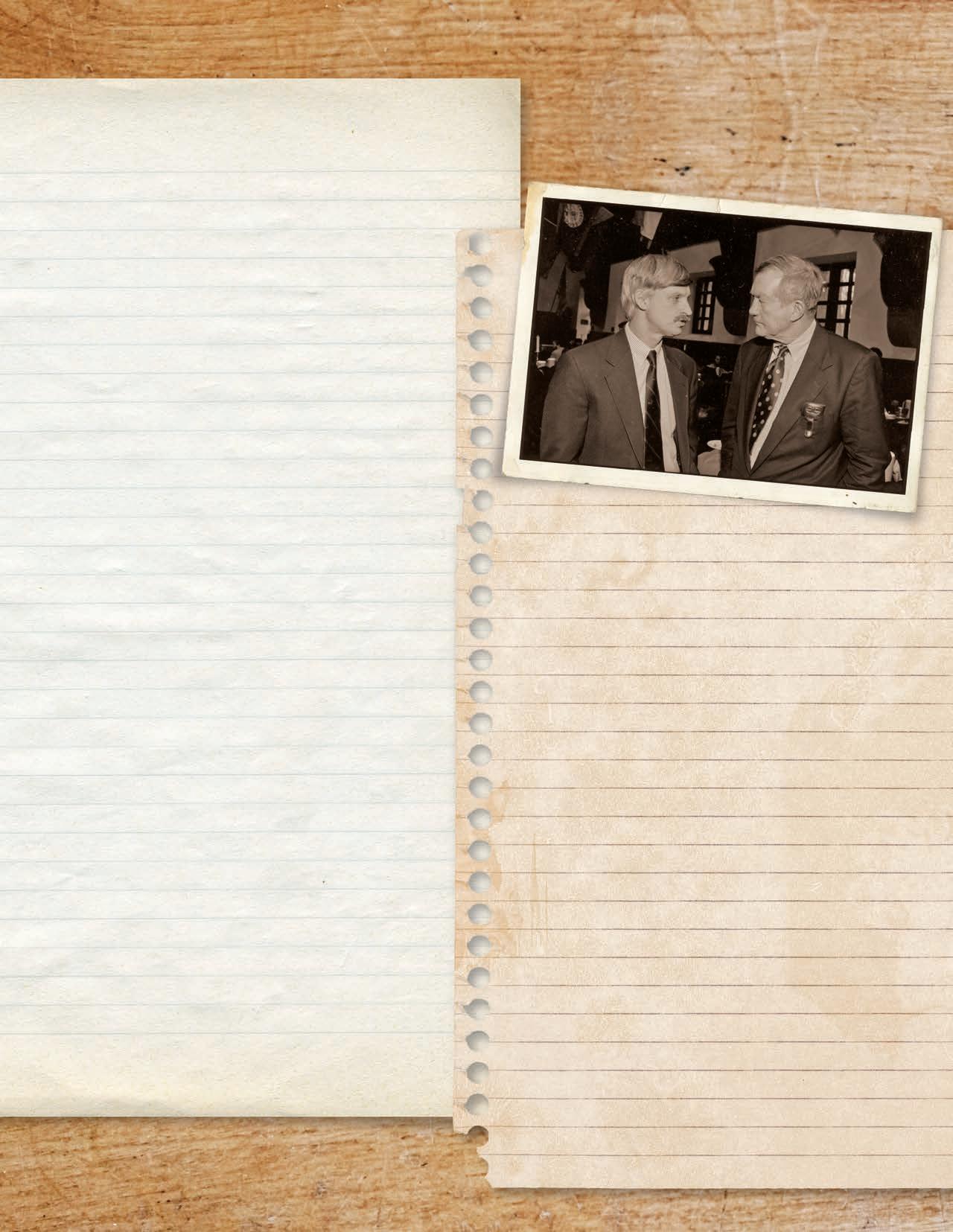
—PETER M. EVANS H’18, P’98
A TRUE MAN OF AVON
BY SETH F. MENDELL ’52
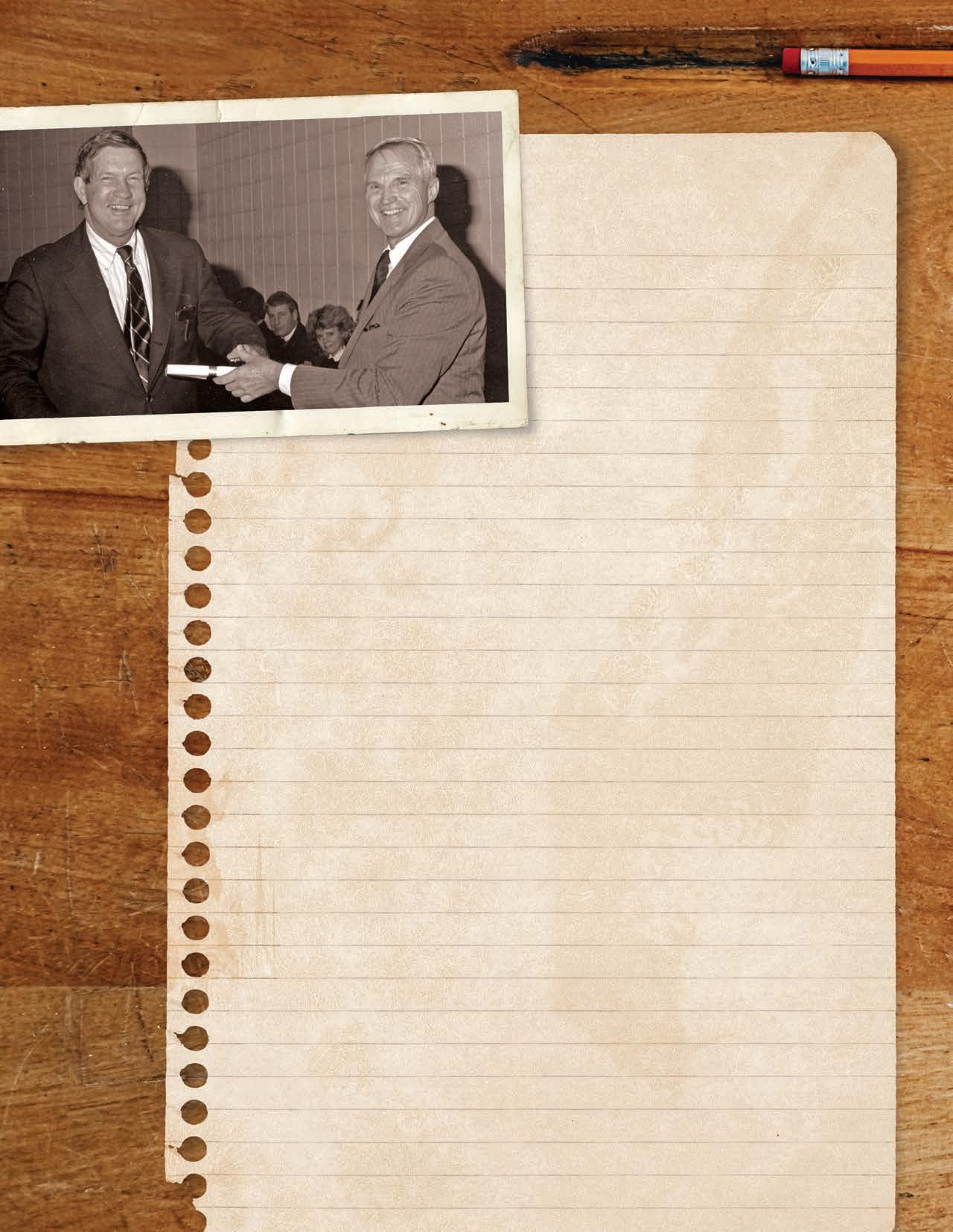
Ifirst met George Trautman in 1967 when he was on the Avon campus as a member of a team conducting the school's 10-year reevaluation. He sat at my table for lunch in the Riddle Refectory, and we had quite a discussion about private schools.
I remember so well the summer and fall of 1969 when the Trautman family arrived on Avon’s campus. George actually commuted between Marion and AOF during the summer in a school van. I was working on my boat, Hekate, at the time and occasionally hitched a ride as I needed materials from Beckman’s Marine in New Bedford. We drove at night to miss the traffic and police. Within months of his taking over the reins of the school, he put me in the Alumni Office and eventually into the Development Office as well. We did two capital campaigns: the Bricks and Mortar Campaign in the late 1970s for the Aron Academic Center and the Leading Edge Campaign in the 1980s to build the school's endowment. All in all, I think we worked well together over those years, 20 to be exact. Our relationship went beyond the Avon campus to the Connecticut River and the Mattapoisett Boatyard in Massachusetts after I retired in 1990. We made a number of trips, particularly aboard the Gannet, up and down the Rhode Island coast, moving the vessel from one port to the other. Eventually, the Gannet stayed at the Mattapoisett Boatyard, where I took care of it for him. I liked George. He was matter of fact in our dealings, and so was I. We were the same age, along with Frank Leavitt, Jorge Consuegra, and Juan Comella. After Ken LaRocque became headmaster, George asked me to meet with him and Louise Adams to chronicle his years as headmaster. We sat in front of a video camera discussing his 29 years as Avon's head. I recall it took three or four sessions. We covered the difficult early years when our school faced the drug culture as well as a shortage of both students and money. If that was not enough of a challenge for a new headmaster, a student athlete died on the football field, the gym roof collapsed, and Harry Rice, director of admissions, passed away. George survived it all. His leadership was evident in every way, and by 1975, Avon was on a very positive course. Once we covered the difficult years of the mid-1970s, we traced the growth of Avon Old Farms over the next 20 years. Starting with bricks and mortar and the renovation of buildings, we covered admissions, faculty, academics, athletics, theater, music, manual arts, and the very positive pride the students had in their school. Through it all, George’s hand was always evident. Avon Old Farms was his school, and he put his heart and soul into it. I feel honored to have served under two headmasters, Don Pierpont for 10 years and then another 20 years under George Trautman, as the school became one of the top schools in the country. George was without a doubt a true “Man of Avon.”
HIS LIFE WAS AVON OLD FARMS
BY KEVIN J. DRISCOLL ’72, P’08
Prep school heads of school have often been portrayed in literature as thoughtful leaders, beloved and adored by their current and former students and faculty and passionately dedicated to their school communities. Arthur Chippings is one such figure of note in the 1939 classic film Goodbye Mr. Chips. He was steadfast in remembering the endearing qualities of the Brookfield Preparatory School for Boys in its earlier days. He believed in tradition and valued the school's sense of self-respect and obligation to family and society. Though Mr. Chips was passionate and noble, even his depiction of headmaster is shallow in comparison to the real-life George Trautman and the legacy he leaves at Avon Old Farms.
George was one of a kind: a complex mix of a laser-focused, tough-as-nails college star athlete combined with a sharp wit and quick mind and overlaid with an uncanny ability to lead a community devoted to providing an oasis where boys become men—good men. He was larger than life, tougher than dirt, earthy, knowledgeable, perpetually enthusiastic, surprisingly funny, and far too humble to fit any of the stereotypical descriptions of a headmaster. George had a vision of how a boy’s school should be run and never wavered from his core concepts. He believed that great mentors understand what makes boys tick, hold them accountable, accept their shortcomings, and celebrate their successes with gusto.
George saw in every boy a man in embryo who needed discipline, affection, and guidance on his journey into manhood. This was the Trautman way, and his high expectations and ability to instill in all of us a strong moral code, a tireless work ethic, and a “never
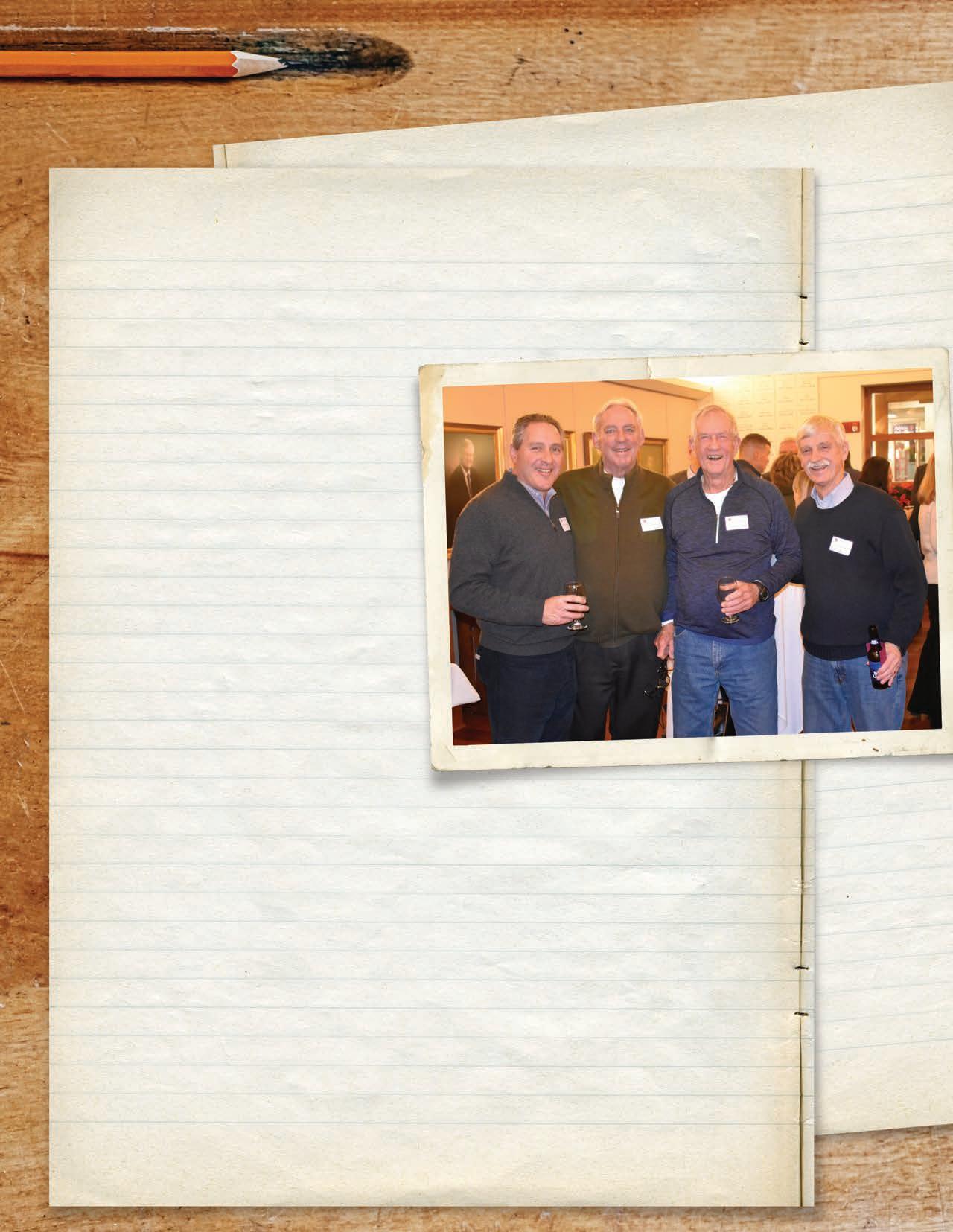
say quit” attitude became the trademark of being a Trautman man.
I will never forget my first meeting with George. My brother Joe, my mom, and my older brother Frank were traveling the prep school circuit, and one visit was to Avon Old Farms. Upon arrival, we were told to head over to the Headmaster’s Office to be interviewed and tour the campus. As we entered the office, a young, athletic presence met us and introduced himself as George Trautman. His firm handshake and way of looking straight into your eyes left a lasting impression. To this day, I follow his example when being introduced to people. We toured the campus, and he extolled his vision and his
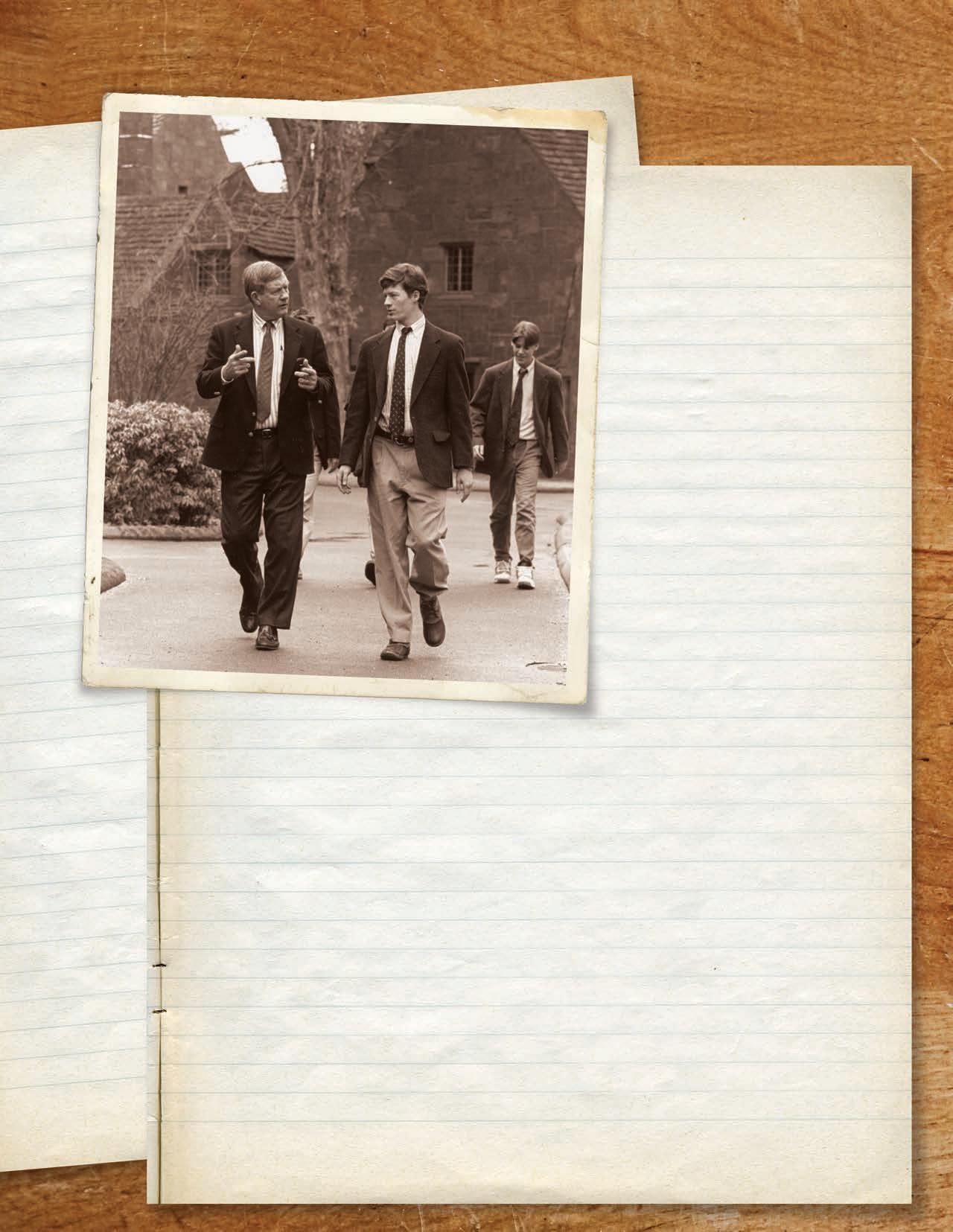
—KEVIN J. DRISCOLL ’72, P’08
plans for the future of the school. He took us back to his office and asked us about our hopes and aspirations. I think he had reached a point of satisfaction and asked us if we would like to attend Avon Old Farms. We quickly responded with yeses, knowing that he was the kind of leader we could follow and the role model we wanted. No other headmaster in New England reached out to potential students and did the tour and interview on their campus visit. In fact, he was the only headmaster we met during our visits. That day, George set in motion a succession of 14 Driscolls who became members of the Avon Old Farms brotherhood, and much of the success we have garnered in our lives can be attributed to the opportunities this remarkable man gave us.
We will miss George and his vise-like handshake, messages of encouragement, and his love for Avon Old Farms School. In his later years, George and I became close friends. Long gone were the days of headmaster and student, and George’s full personality became known. He had an incredible sense of humor. Behind the intense stare and handshake was a good friend with an occasional joke at just the right time. When I looked at George, he often had that sparkle in his eye followed by one of his quips.
George was humble, never looked for credit, and always sought the higher ground of excellence in all of his endeavors. His generosity was legendary but discreet, and much of what he did for students and faculty happened behind the scenes. George Trautman influenced thousands of young men, and his spirit, traditions, and the warm and caring culture he inspired will be a part of the school and who we are as men forever.
A DIFFERENT KIND OF SCHOOL YEAR
BY HENRY COONS ’71
In the fall of 1968, as I entered my first year at Avon as a sophomore, the United States was at a tumultuous time in its history. On September 28 of that year, Headmaster Don Pierpont passed away suddenly while in Boston. For the students who knew him well, it was a shock. It took a long time for them and the veteran faculty to digest.
With the sudden loss of our headmaster, the 1968–69 school year was cobbled together by veteran faculty members and interim Headmaster Alan McMillen, who had recently retired as a headmaster of a girl’s school. It was a difficult year for the school and the nation, but it was also a year in which a young faculty member at Tabor Academy was hired to be the next headmaster at Avon Old Farms.
During the summer of 1969, incoming Headmaster George Trautman sent a letter to all incoming students requiring them to have short haircuts on return. He would personally drive those who came back with long hair to the barber shop—or to the airport or bus station. My room that year was in Diogenes Tower overlooking the main entrance to school, and I witnessed Mr. Trautman driving students off campus. Most of the students went to the local barber shop. The new guy was making a strong statement, and I recall a
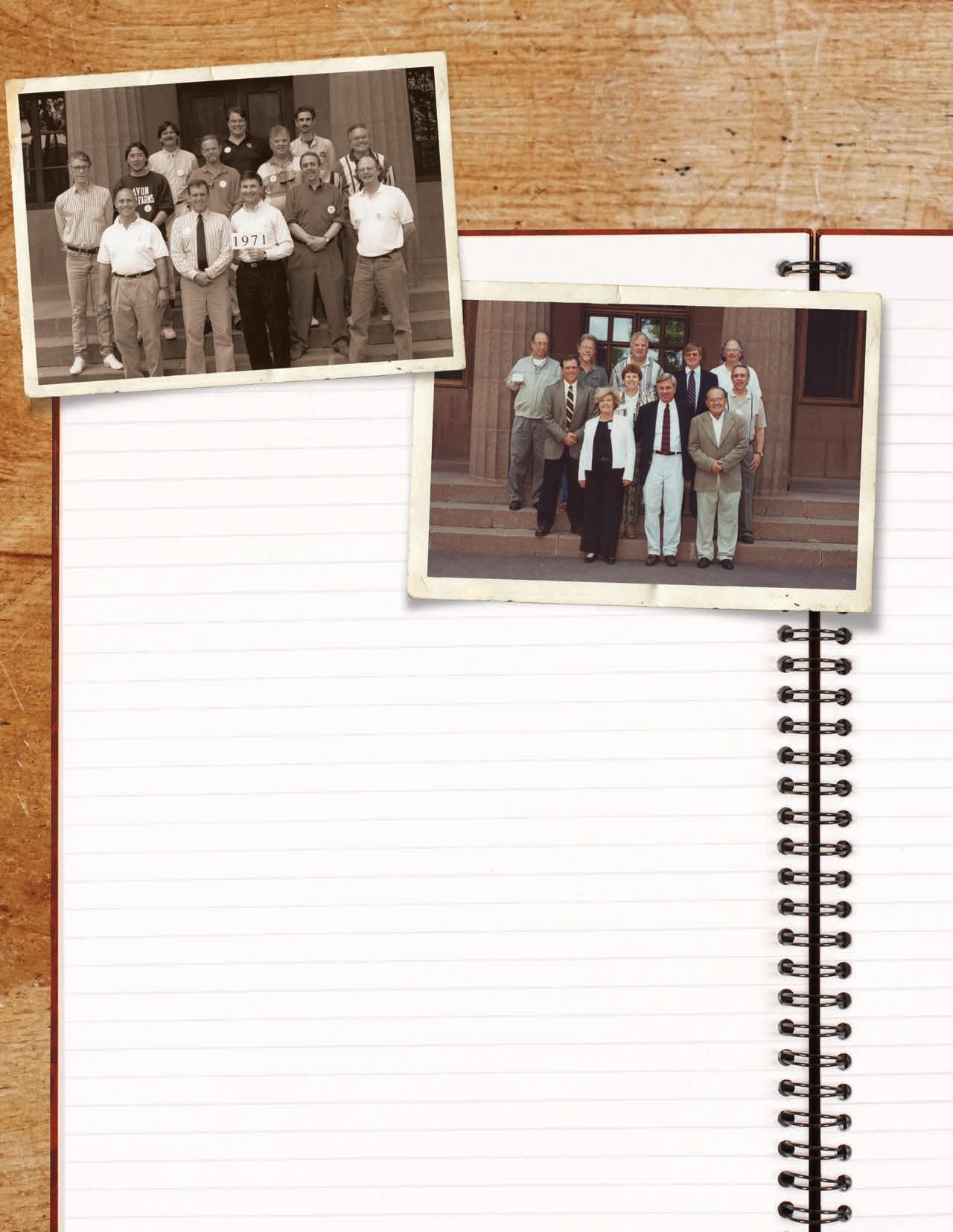
senior monitor coming into my room and saying, “This is going to be a different kind of school year.”
During George’s first year, varsity football secured a victory over a very strong Kingswood team by the score of 24-20. It was the first signature win under the new head of school and the beginning of Avon’s dominance in a handful of varsity sports over the past half century.
From day one, George meant business. For the next 29 years, he held fast to certain principles, and he never wavered, including the commitment to stay an all-boys school; maintain a strict hair and dress code; have sit-down meals, Saturday classes, Morning Meetings, chapel three times a week; and strengthen, over time, every phase of school life. He overhauled academic and athletic programs, grew the visual and performing arts programs, and moved toward technology inside and outside the classroom.
When I graduated from Avon in May of 1971, I was excited to head to college. I knew, however, that Avon would always be my foundational educational experience.
—HENRY COONS ’71
Following my four years at Muhlenberg College, I lived in New York City and taught at the Searing School in midtown Manhattan. In the spring of 1976, I returned to Avon to celebrate my class’s fifth reunion. On Saturday afternoon while watching varsity baseball, I saw George and walked up to him to say hello. On a whim, I casually asked him if he needed someone to teach a little history and coach a little football. His reply came instantaneously: “Come to my office tonight after the banquet and sign a contract.” That night, I signed a contract for $6,200 to teach English and history and probably coach football, basketball, and baseball at some level. I happened to be at the right place at the right time.
As a faculty member working under his leadership for the next 22 years, I witnessed a man who stuck to his principles, suffered and overcame tragic episodes involving students and faculty, and created a strong foundation for the seamless transfer of leadership to Headmaster Ken LaRocque for several decades and now to Jim Detora.
On an overcast day in mid-April right around his 87th birthday, I called George to say hello and catch up a bit. At that point, he must have known that his health was rapidly heading in a bad direction. I was unaware of the critical nature of his condition, and he never mentioned anything related to his health. That was the kind of man he was: tough,

focused, direct. It was a good conversation, and it was really good to hear his voice, a voice I had first become familiar with more than a half century earlier. I am really glad I made that call. It turned out to be good closure for me from someone who believed in me and supported me for so many years. I think he knew it would be our last conversation.
Whenever someone asks me about George, I like to tell them the story of how he used to drive to chapel in the winters in his old station wagon on Tuesdays and Thursdays. On several occasions when it had snowed the night before, George removed a handful of snow from the middle of his driver side window so he could have some limited yet focused and undistracted vision to get him to the chapel. That single-minded focus and adherence to his own vision and principles for Avon Old Farms School, untainted by administrators and faculty who had their own agendas of how to run a school for boys in the picturesque setting of the Farmington Valley, is, in my mind, his enduring legacy.
WISE AND (OCCASIONALLY) WILY
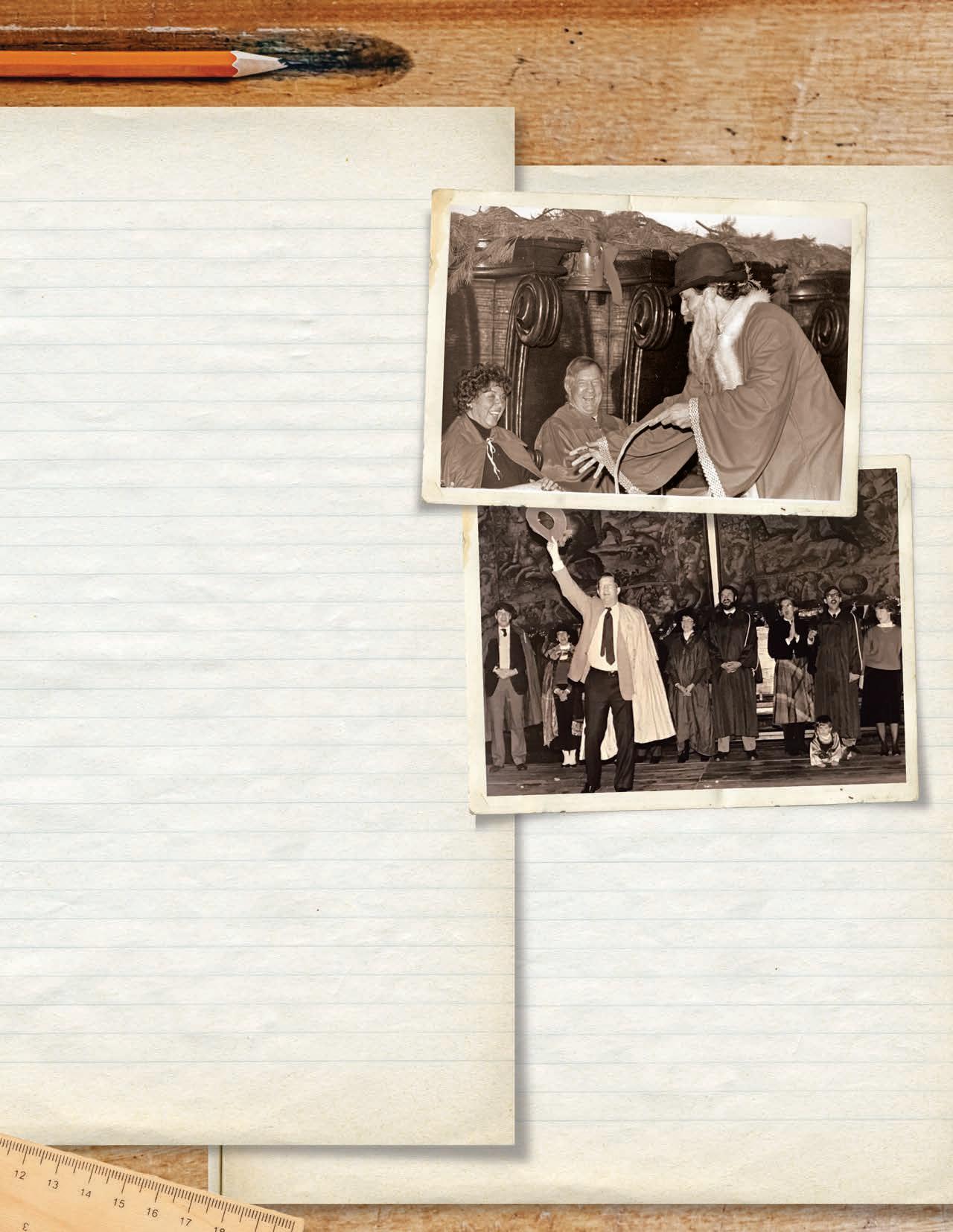
BY TIM TRAUTMAN ’75, P’03
Iwould describe my father as being both wise and, on the rare occasion, wily. I like to think Dad employed both of these strategies effectively in leading Avon. In addition, I remember him saying, “Telling a story can be a great way to communicate your message.” With that, let me take a page out of his playbook and tell you a story...
It was a rainy, cold, dreary Saturday night in December 1973. Seniors had just finished practicing for Boar's Head, and with Christmas break only three days away, we were all anxious to be done with exams, Morning Meeting, Christmas Vespers, etc., etc. Mr. Mason had assigned Boar’s Head roles and distributed the animal costumes. In Elephant Dormitory, guys were roaming the halls. Left to their own devices (never a good thing for adolescent males), several of the guys, one still dressed in his gorilla costume, decided to go “dodging cars.” This meant taking the path through the woods behind the library down to Beaver Pond. At that small section of road between the woods and the pond, they’d wait in the bushes until a car came. When it did, they’d jump into the road, forcing the car to a sudden stop, then quickly disappear into the bushes until it drove off. Even though it was cold and rainy, it was still fun … until this one car came along.
Instead of slamming on the breaks and then hastily driving off, the driver stopped, and the driver’s-side door opened suddenly. In the dim light and amid the chaos someone caught the car’s license plate, GT 68, and yelled, “It’s George!” The boys took off and ran back up the path, over exposed tree roots and through the mud. Looking back, they were horrified to discover that George, still in his coat and tie, was on their heels and charging in hot pursuit up the same muddy hill. Luckily, youth prevailed and all escaped, all except the gorilla! He scrambled on all fours up the hill in his sodden, muddy gorilla suit, but George caught up and grabbed him by the ankle. Fear is a tremendous motivator, and with a burst of adrenaline, the gorilla shook himself free and made his way to the top to safety.
The next day, George rounded up the “usual suspects.” Standing before these seniors was the headmaster, the quintessence of intimidation with his eyes boring into their
very souls, bellowing, “I don’t care about any of the others; I just want the gorilla!” George proceeded to challenge each individual. With his imposing presence, inches from their very noses, he barked, “Were you the gorilla?” Each quivered but replied, “No.” When George reached the actual gorilla, the boy replied with all the respect (and courage) he could muster, “No sir, Mr. Trautman, I was in my room studying.” Seemingly inconclusive, the meeting ended, the three days passed, Boar’s Head was a success, and Christmas vacation came.
More than 40 years later, at an Avon reception in Boston, a couple of alumni were having dinner with Peter Evans and my father. As is the habit, the group reminisced, regaling one another with often-told stories of their days at Avon. As coincidence might have it, seated at the table that night was the alumnus who 40 years previously had been the gorilla on that fateful December night. No longer fearing for his high school and college education and entire future, he retold this story, thus revealing the identity of the gorilla … himself! With newfound confidence, the gorilla added he’d also been drinking before dodging cars and proudly announced, “I was probably half gassed at the time.” Never at a loss for words, George quipped, “I was probably half gassed, too!”
After the reception, while driving home that night, I thought about that evening in December ’73 and Dad’s meeting with the “usual suspects." It struck me as odd that Dad actually believed the student who said he was studying on a Saturday night after Boar's
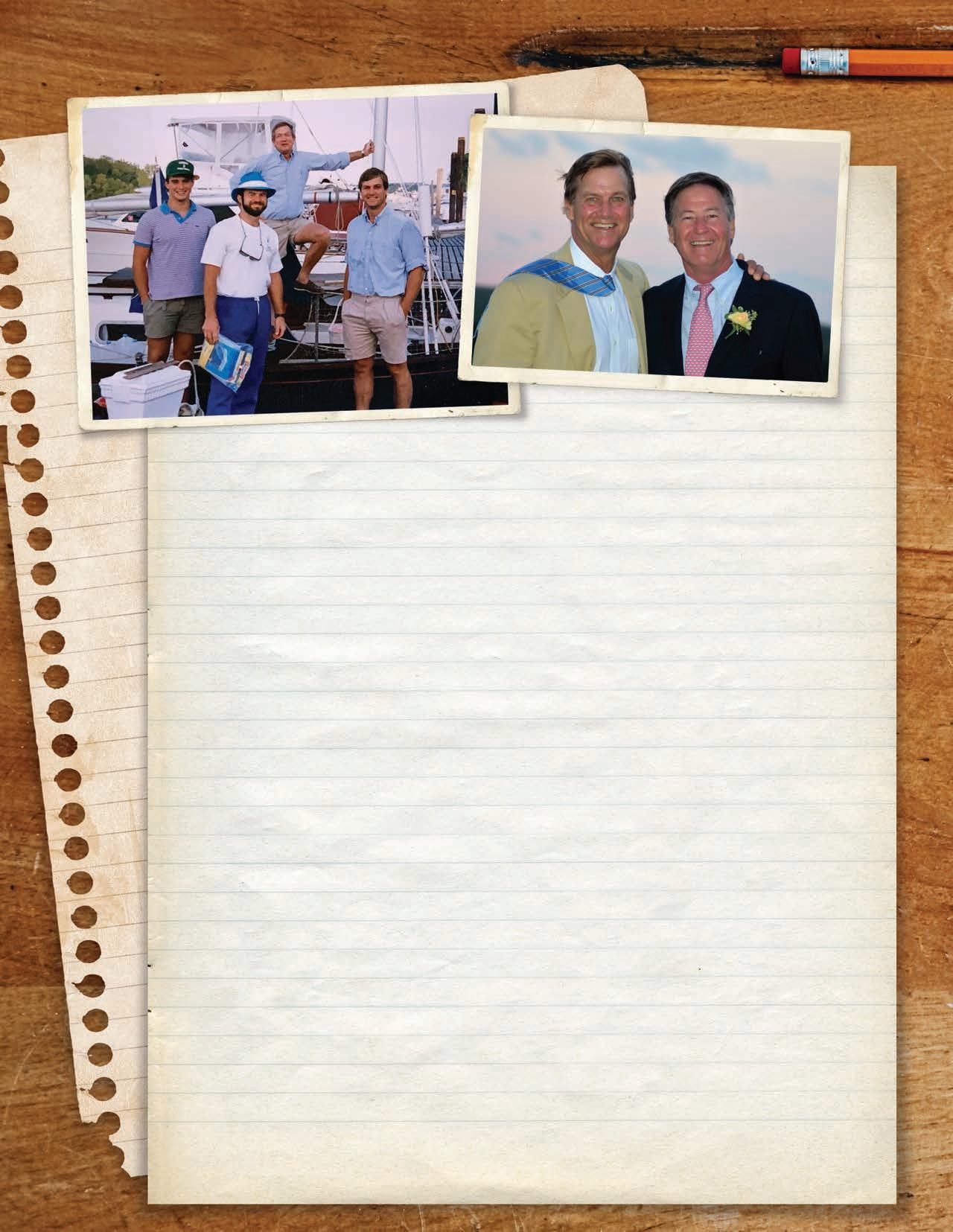
Head practice. Based on personal experience, let me say that Dad could smell a lie a mile away! So, I asked him directly if he ever really knew who the gorilla was. Dad's reply seemed to momentarily take him back to his days as a student at St. Paul's School. After a long pause, he stated pensively, “My headmaster could have thrown me out of school.”
Now, years later, you should know the “gorilla” is happily married, has wonderfully talented daughters, developed an extraordinarily successful business career, and has even served on Avon’s Board of Directors. That begs the question: what was Dad really thinking, and what decisions did he make the day the gorilla told him he was studying? For his 29 years as Avon’s headmaster, my father knew every student by name, the teams they played on, and much of their personal background. To him, it was as easy as remembering his own birthday because Dad cared deeply about each student. He often said, “I always go the extra mile for a kid.” So, although discipline was his hallmark, Dad had a big heart and every once in a while, I think, he decided the “right thing” required a different strategy.
For me, I'd like to say thank you, Dad, for all the advice you gave me over the years. I hope this story tells alumni about another side of their headmaster. In closing, I found this quote on an Avon pad in his house, written in his own hand: “A man who knows love and grief understands that one is the price of the other.”
HE KNEW WHAT HE WANTED TO DO IN LIFE—AND HE DID IT
ALLAN O’CONNOR ’75
Iwas a freshman day student when I met George in September 1971—as far apart as you can be in the hierarchy at Avon. I remember his bone-crushing handshake, his booming voice, and his strong, intimidating presence. I was scared of him and did my best to avoid him. “Mr. Trautman wants to see you” was not something an Avon boy ever wanted to hear. That changed when we reconnected at my 20-year reunion, and he asked me to join Avon’s board.
Being an advisor is different from being a student or working at the school. I found George open to advice and new ways of doing things. We just clicked and, over time, became close friends. We visited each other regularly and talked every few weeks for decades—long after I had left Avon’s board.
George never lost his zest for life and was always full speed ahead. When he was 76, he visited me in Lake Tahoe and announced he wanted to go skiing—something he had not done in decades. We got off a Squaw Valley chairlift, and George headed down a long slope, steadily picking up speed. I watched in horror as it became apparent that if he had ever known how to turn, slow down, or stop, those skills were long forgotten. I feared I’d never be able to attend another alumni event if I killed the former headmaster. But George laughed off that first crash and spent the remainder of the day exuberantly skiing himself to exhaustion.
With that same passion, George always knew he wanted to run a school. After his very first faculty meeting as a new teacher at Tabor Academy, he went up to Tabor’s
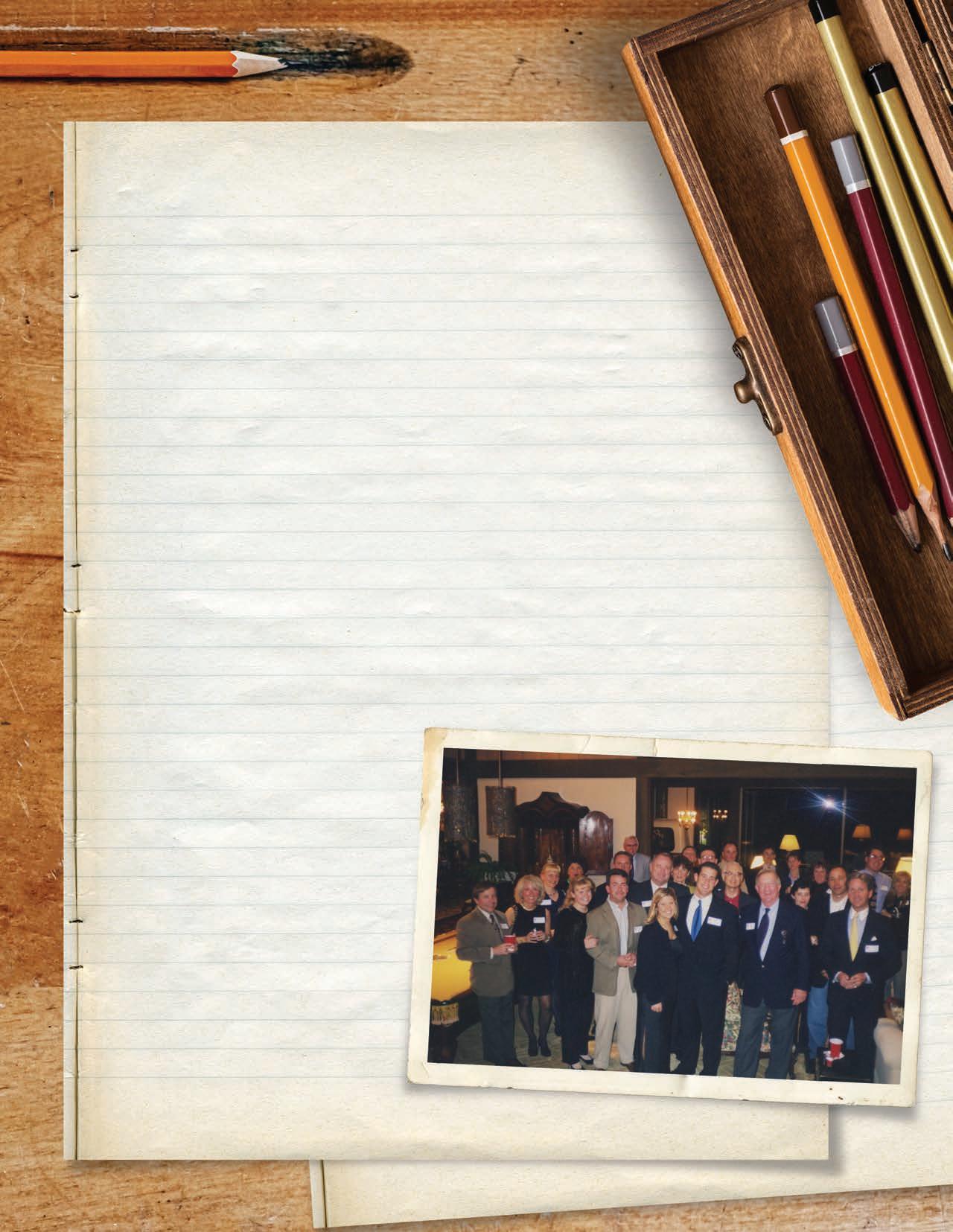
headmaster and asked him what he needed to do to end up in his shoes. “Learn every single thing you can about the school business,” he was told. George took that challenge head on, rotating through a number of key positions while fleshing out his own views on how a school should work.
When he arrived at Avon in 1969, George was ready to implement his strong vision of how a boys’ school should be run. With his natural authority, he set about changing Avon’s character and culture. He was in charge, and people tended to do what he said. Organizations respond well to strong leaders who provide a consistent and clear vision, and George provided that. He successfully built a strong, unique culture at Avon—a
primary reason so many of us love the school. He believed in setting high goals, working hard, and keeping busy. Knowing teenage boys need structure and tradition, he kept things simple, clear, and focused.
George took pride in knowing every boy in the school, greeting us as we walked into Morning Meeting or crossed paths on campus. He was a stickler for tradition, such as sit-down meals, weekly chapel, and all-school Morning Meetings. Avon was a family, and it was important to him that the entire family assemble daily.
Students respected but also feared him. At one board meeting, the librarian proposed the school install a scanning system as books had started to “disappear” from the library shelves. During a break, I suggested George forget the newfangled tech and just give one of his “fire and brimstone” speeches that had terrified me as a student. George smiled, pulled the request, and reported back a few days later that the problem was solved—the missing books were back.
I once asked George why Avon always had so many activities on Friday and Saturday nights. He said, “We have 300 teenage boys who live here. If we don’t come up with something for them to do, they will, and we may not like their choices.” He indeed knew teenage boys.
I last saw George for dinner in February right before the COVID-19 crisis hit. We chatted for hours about his favorite topic— the school. Although he avoided public praise and recognition, he was proud of his life’s work and what he had accomplished at Avon. Very few have ever had such a positive influence on so many lives. He had done what he set out to do.
I am blessed to have known George both as my headmaster and a lifelong friend. I shall miss him greatly.
REFLECTIONS: EXPERIENCING GEORGE AT THE HELM
BY KENNETH H. LAROCQUE H’19, P’01, ’10
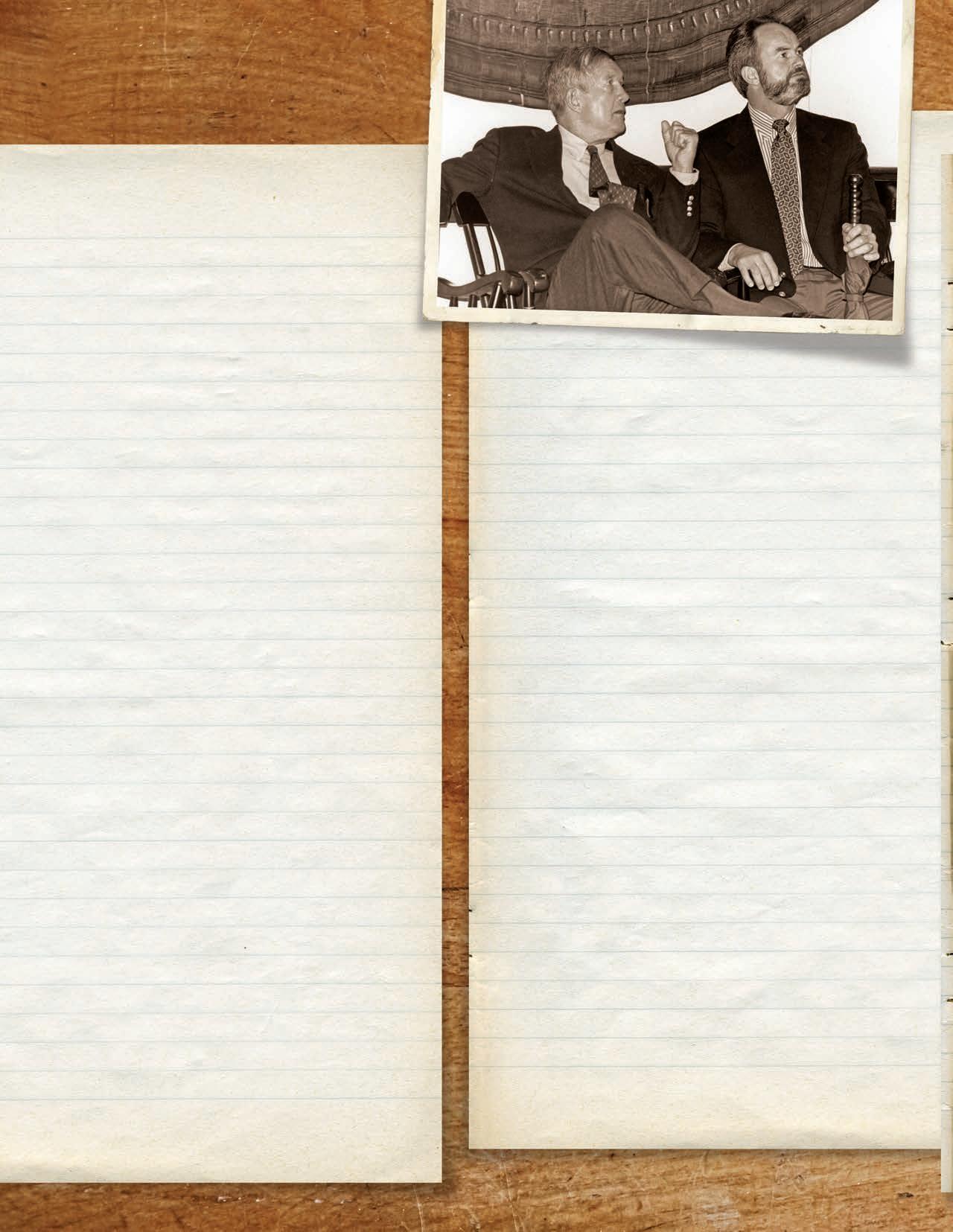
Since learning of George Trautman’s passing, I have been processing his loss and expect that I will continue to do so for some time to come. George influenced thousands of Avonians, faculty, and friends of our school during the 50-plus years he served Avon Old Farms. He was a legendary head of school, not only among the AOF community but also throughout New England independent school circles. George’s stature continued to grow during his retirement, as did his legend as alumni, faculty, and colleagues at other schools shared “George stories” whenever his name surfaced. Even an embellished “George story” is grounded in truth, and the truth is that he was a strong, superb school leader. Bold, fearless, and unwavering in his beliefs, George led Avon Old Farms through tumultuous times during the Woodstock era and successfully championed boys’ schools while so many brother and sister schools were embracing coeducation. Tough love, high expectations, school spirit, traditional values, and personal accountability represented the pillars upon which Avon stood during his reign.
Processing George’s passing brings back so many memories. I smile remembering that I experienced his driving only once. After that escapade, I always planned our trips so that I or someone else was behind the wheel. The same
held true for sailing trips. After barely surviving a significant storm sailing to Bermuda with George as captain, I agreed to another Bermuda sail only if George joined me on the crew under a different captain. I learned of George’s penchant for throwing caution to the wind no matter the danger early in our friendship, and though I admired his courage, I decided that preemptive action on my part would protect us both. Of course, George’s courage served him well throughout his life, especially during the 29 years he led Avon Old Farms. He always decided the proper path to pursue based on what he perceived would benefit our school without regard for convention, ease of execution, or other superficial considerations. I worked for and with George for 17 years before succeeding him as head of school, and we enjoyed a rich professional and personal relationship for many decades. The lessons I learned, the adventures we shared, the challenges we confronted, and the connection we forged are an important part of my life and will forever be. Heidi and I hold George’s family in our thoughts and prayers and know their memories of him will comfort them. Finally, Avon Old Farms will flourish for many decades thanks to the leadership and contributions of this icon.
How Did One Get to Know George Trautman?
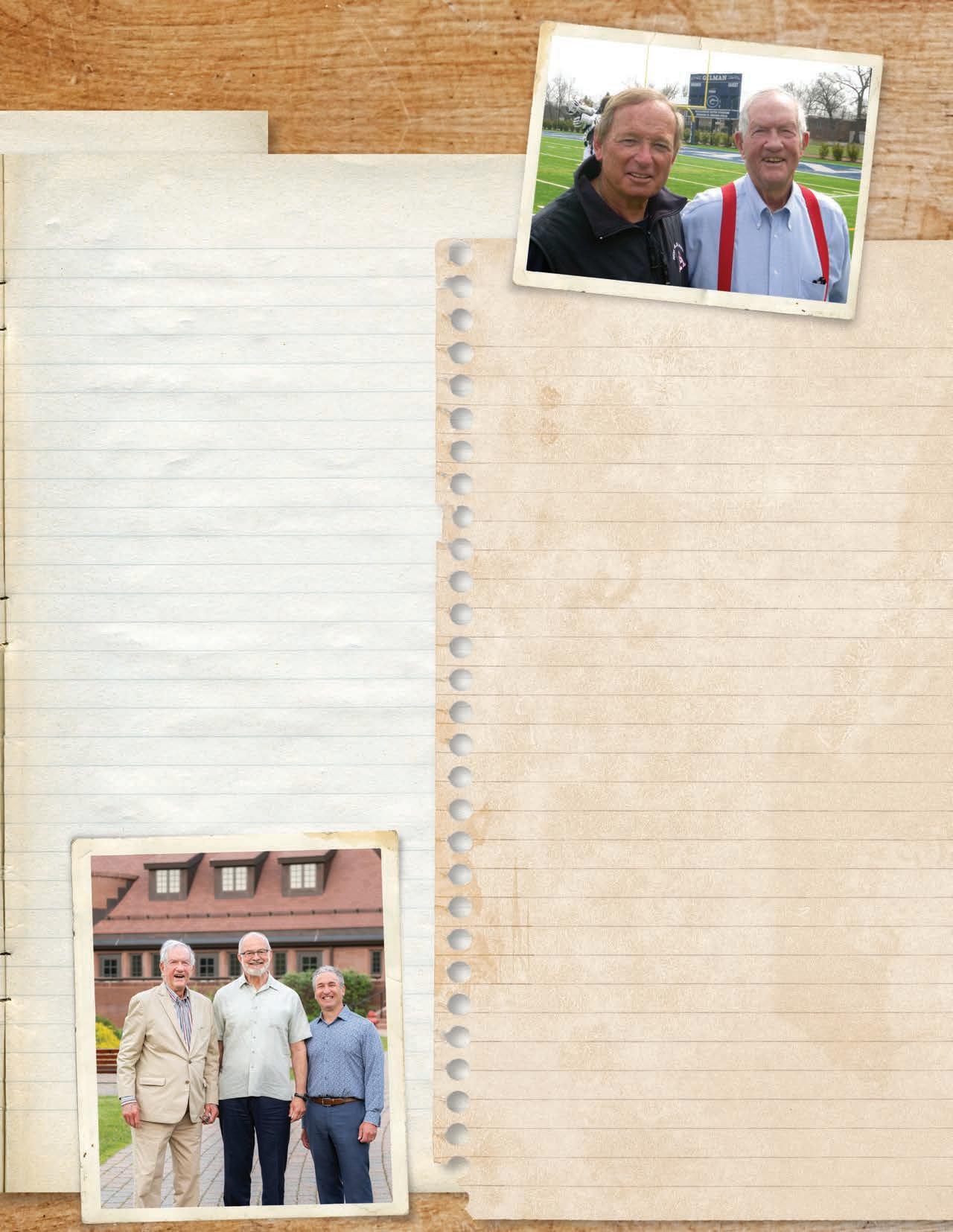
BY PETER M. EVANS. H'18, P'98
It was not easy for two reasons. First, he was a very private man by nature and utterly self-sufficient. Second, like all effective benevolent despots, he kept his distance. If he had weaknesses with respect to dealing with the people in his domain, he never exposed them. In fact, it is appropriate to say that he was a political genius at balancing the sometimes-countervailing forces of trustees, parents, alumni, faculty, and students—while never losing sight of what was best for the school.
George was not an intellectual in the professional sense, yet he read much and knew much and was a master of reason. He spoke his mind— always. His candor and honesty were overwhelming. There was nothing soft about George Trautman. One was confident that he could render an extended limb useless with a handshake. Yet deep beneath this rugged exterior was a man whose compassion and sensitivity were boundless, subtly permeating his entire being.
Only over the years does one begin to realize that this hidden dimension quietly operated in so many of his actions. Perhaps, herein, is the secret of his magic: he conveyed a father image to the community at large—boys and adults. If they had a problem, they went to George. His door was always open. However, like a father, he did not hesitate to go to you—with good news or bad— because he cared. The elements of trust and mutual respect provided the underpinning to his charisma. He was proud but exceedingly humble; he was not generally comfortable receiving compliments or recognition, perhaps because he sensed that there was always much unfinished business…
HE MADE IT OUR SCHOOL
J. MATTHEW KOWALCHICK '99
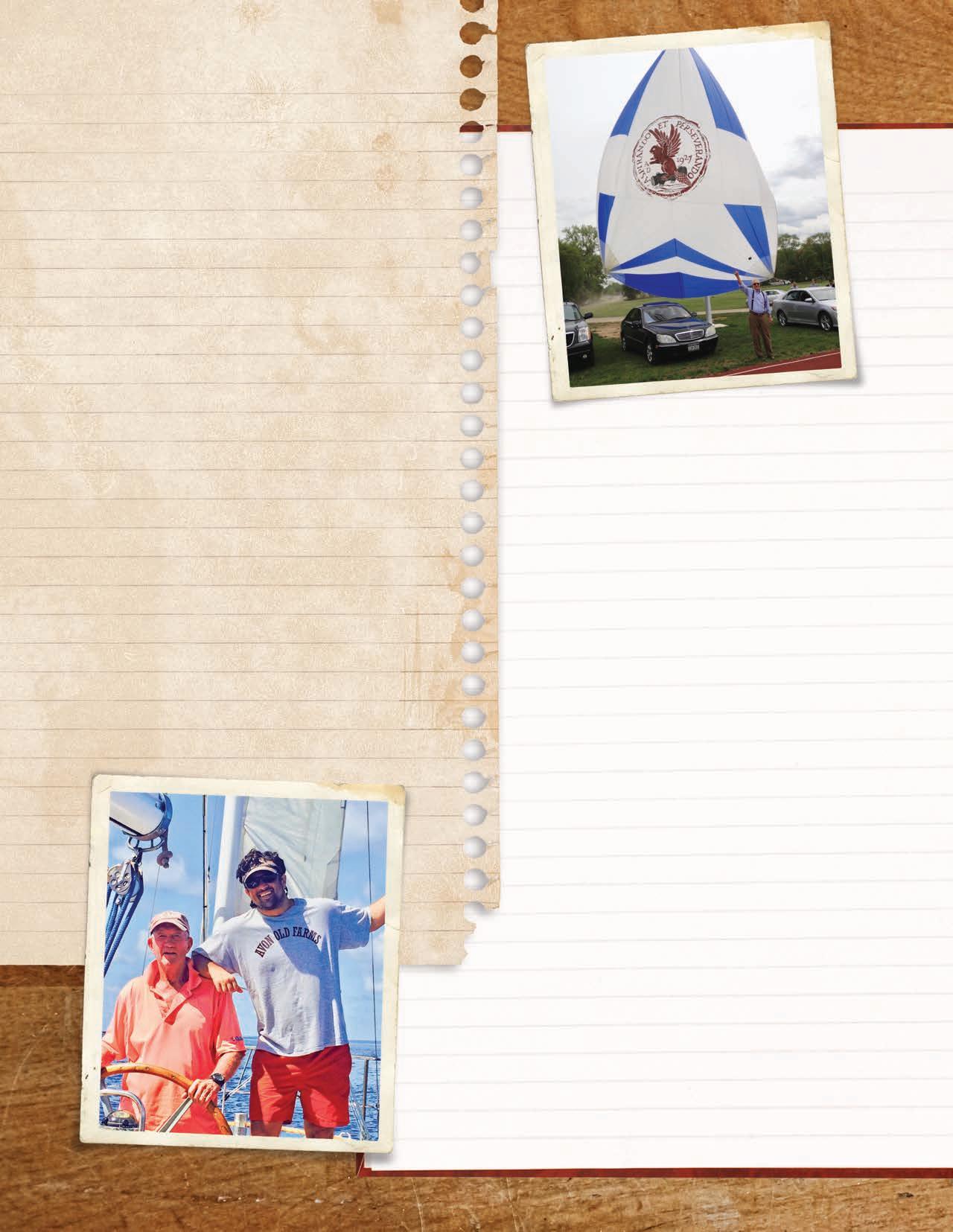
George Trautman (GT) gave me and thousands of other boys the opportunity to be a part of something bigger than ourselves. He demanded absolute buy-in: it was all or nothing, his way or the highway. One of the first things he said when boys arrived on campus was, “This is your school.” He created pride of ownership, a fierce loyalty to Avon that is still seen and felt today. GT had zero problem taking a stand on an issue; he made his decision swiftly and it was final—you always knew where you stood with him. There was never a gray area for George: things were black or white, yes or no. For a young boy, there was something comforting about this, even when the decision was not in his favor. When George spoke, you listened, and when he asked something of you, there was a sense of empowerment—you felt valued, and you never wanted to disappoint him or let him down. To this day, I’ll never understand how he did it, but I always wanted to make him proud.
A LESSON IN LEADERSHIP
BRIAN CONROY ’82, P’20
The summer before my senior year, I was working with the school’s buildings and grounds crew. I had been elected warden of the school, and one day that summer, I received a request to have lunch with the headmaster. I was terrified. I had always taken responsibility very seriously and had always been a good student, but I knew this meal with George Trautman would be a big moment.
When I arrived at his office, George, in a typical power move, was sitting behind his desk, and I had to sit across from him. As we began our meal, he talked about leadership and how leaders have to hold themselves to a higher standard than others. He asked me if I understood, and I said, “Yes, sir, I do.” But he continued, “Well, let us be clear: if someone is caught walking across the Village Green, what happens?” I replied, “They go to student court.” He said, “Yes, that’s right. And what will happen if you get caught walking across the Village Green?” I said, “I would go to student court.” And George said, “Wrong. You’d go to the discipline committee.” I was stunned. He then continued for round two: “What happens if someone gets caught drinking alcohol?”
“They go to the discipline committee and usually get a second chance and pay a penalty,” I said. “Right. And what would happen if you were caught drinking alcohol?,” George asked. “I would go to the discipline committee?” George was clearly frustrated that I hadn’t caught on at this point and said, “Wrong. I’d throw you out of school.” One last time, George asked me a question: “What happens if students are caught smoking marijuana?” “Well, they would go to the disciplinary committee and be summarily dismissed,” I said. “That’s right. And what would happen if you got caught?,” he asked. “I guess I would get thrown out of school?” I replied warily. Then George said, very matter-of-factly, “I would take you behind the gym for some discipline and then let the police collect you and call your father.”
He went on to talk about the absolute importance of holding myself to a higher standard. He said if I was not ready to do that, then I was not ready for the higher level of accountability that came with being a leader, and I should not aspire to roles of leadership because that was the yoke I was going to have to bear.
To this day, that conversation has a profound effect on how I carry myself and how I live my life. Only George could crystalize something so profound and deep into a simple allegory in which there was no chance of misinterpreting his message. Of his many strengths, that is one of the things I so admired about George: his directness, his honesty, and his passion for developing boys. And that’s just one boy’s story of how his life was forever impacted by one conversation with George: I will remember that lunch for the rest of my life. In all the businesses I’ve run and all the leadership positions I’ve had, I’ve reflected on that conversation, not only for myself but
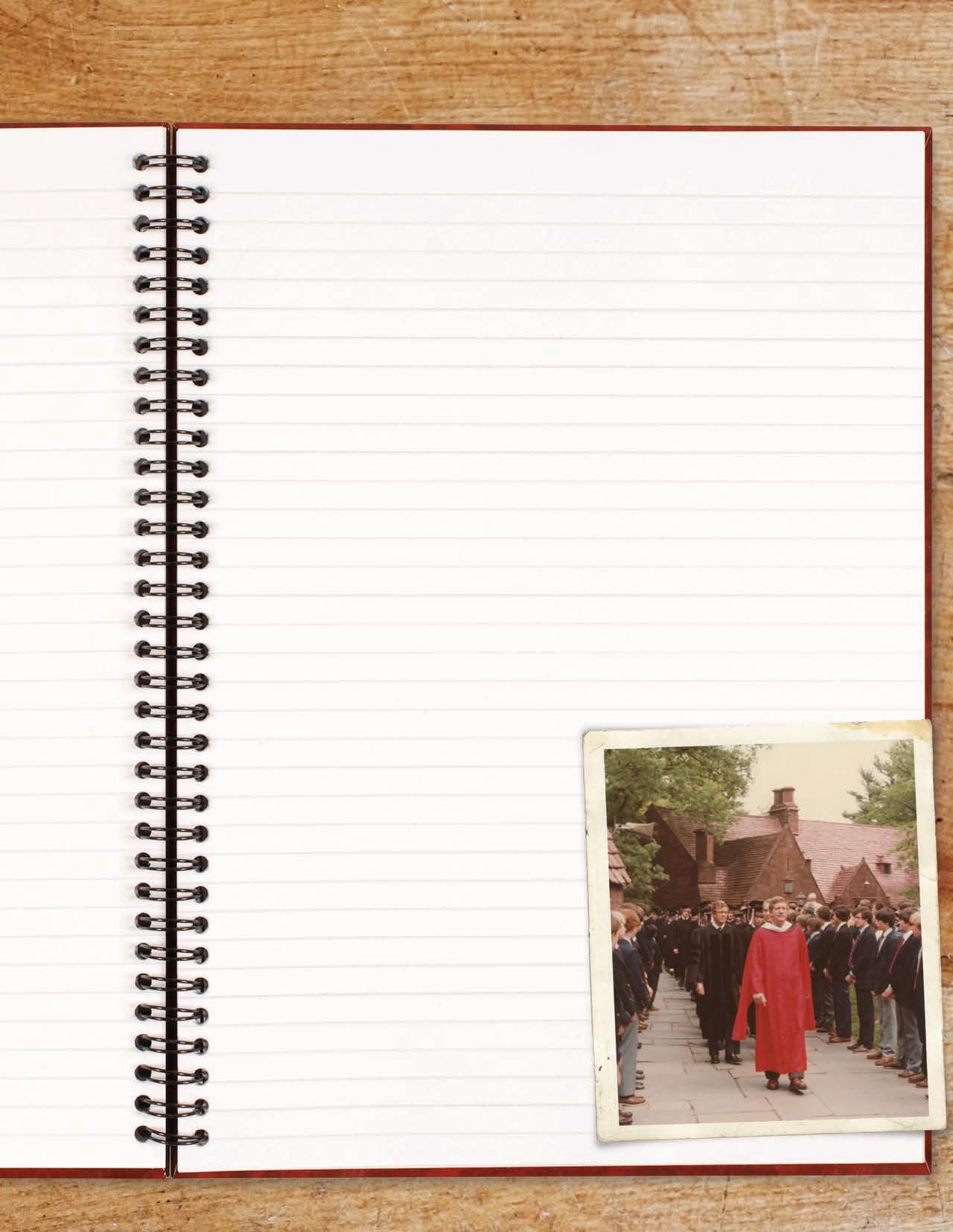
also for the development of new leaders. And that’s George’s impact.
Even after George retired, his was always a voice I knew I needed to heed. Whether it was as an honorary member of the board or otherwise, for the rest of his life, whenever George wanted to talk to me, I said yes—even if the timing was most inconvenient. On one occasion I was in Dubai, and he wanted to have a call with me. With the time difference, it was the middle of the night for me, but I needed to make that meeting because George wanted to chat. The last time my wife and I had dinner with George was at a lacrosse dinner. There again is an example: I was a baseball player, but if there was a chance for me to sit at a table with George, I went. I didn’t question why.
George was tough, but his toughness was in his resolve: he had a vision, he was decisive, and he was bulletproof. They don’t make ’em like George anymore. I’ll miss him, but I’m just so pleased and touched that he was a part of my life from the time I was 14 to today.
LIFE IS AN INTERESTING EXPERIENCE
BY MATT TRAUTMAN ’03
My grandfather used to say that life is an interesting experience. In the way he said it, there was a little bit of dry humor, a little bit of his simplistic yet highly perceptive interpretation of the world, a little bit of his natural humility, a tiny bit of detachment from the ups and downs that we all experience, and, most of all, a genuine appreciation for how interesting life can be.
As a child and an adolescent, I had a somewhat one-dimensional relationship with the man who would eventually become one of my greatest friends. I saw him as many people saw him: confident and bold, physically imposing, and handsome. He knew exactly who he was and what he wanted to do. He was unfazed by conflict. When he wasn’t relentlessly running Old Farms like the emperor of a small, prideful city-state, he was off pursuing one of his many hobbies. He loved to fish offshore, to hunt, to sail, to travel abroad, to drink, and to laugh. He was wild and stylish and fun. He was a fiercely intelligent independent thinker, with a truly immersive and action-oriented approach to life. Unsurprisingly, he could also be a very polarizing personality. I often heard it said that when it came to George Trautman, you either loved him or you hated him.
I am proud to say that I am my grandfather’s grandson and have undeniably inherited many of his hard-headed personality traits. Today, these are some of my most prized and effective characteristics, but when I was younger, having a relationship with an equally stubborn and willful authoritarian was periodically rocky. We had a falling out during my college years and didn’t speak for more than half a decade. We started talking again just before Christmas 2010, and something drastic had changed in me. I no longer saw

my grandfather as an opposing force but instead was able to start seeing him through a much more objective lens. Thus began my truly privileged journey of getting to know the man—in his entirety. I got to see beyond his more obvious traits and started to realize just how nuanced and impressive he really was.
He loved animals. He systematically fed wildlife almost on a daily basis. He was hyperorganized. Every aspect of the man’s life was meticulously orchestrated. He was an extremely devoted husband. Until his last day on this Earth, he visited Barbara outside her hospital window (he couldn’t go inside because of the coronavirus restrictions) and scattered seeds on the ground so she would be able to watch the birds. He was a voracious reader; he read for at least two to three hours every day. He had a keen, perceptive interest in world news, politics, and finance. I never had a conversation with him in which I was more up to date on any of these subjects than he was. He was an intent and active listener. As a result, he really got to know people and the intricacies of what they were doing in their lives. He enjoyed playing cards, and he was good at it. We were on a trip together last September, during which we played gin rummy every day. And I couldn’t beat him— 86 years old.
He was very humble. When I was younger, I always thought he had a massive ego, but this observation was incorrect. I confused his drive and action with self-importance. He cared far more about the well-being of the people in his life and the well-being of Avon than his own esteem. He was a good dancer. This I did not inherit. He was exceedingly generous and freely spent money on the things he liked, but he was one of the cheapest people I have ever met when it came to pretty
much everything else. He said that if you’ve ever experienced real poverty (which he had, growing up “homeless-adjacent” on the streets of Baltimore during the Depression), no matter how much money you make, part of you will always feel poor. Because of his experiences as a kid, he never lost his appreciation for every single thing that he had.
He was absolutely honest when it came to things that actually mattered. I don’t know if this was just an innate tendency or if he simply knew that not telling the truth would inevitably cost him time and energy, but, whatever the reason, his integrity was unwavering. He had an unparalleled gift for getting people to do what he wanted them to. He had two methods for doing this: his heavyhanded approach was obvious, but he also had a very subtle, chess-like method that he employed much more often and was bafflingly effective. He was a health nut. He was very calculated about what he put into his body and worked out three times a week without fail. As a result, he was able to continue with his (often strenuous) hobbies all his life. When he was 84, we traveled together through North Africa over a fun but grueling two weeks, and he didn’t miss a beat. It was incredible. Matt Kowalchick used to say that on these trips, GT would “Benjamin Button.”
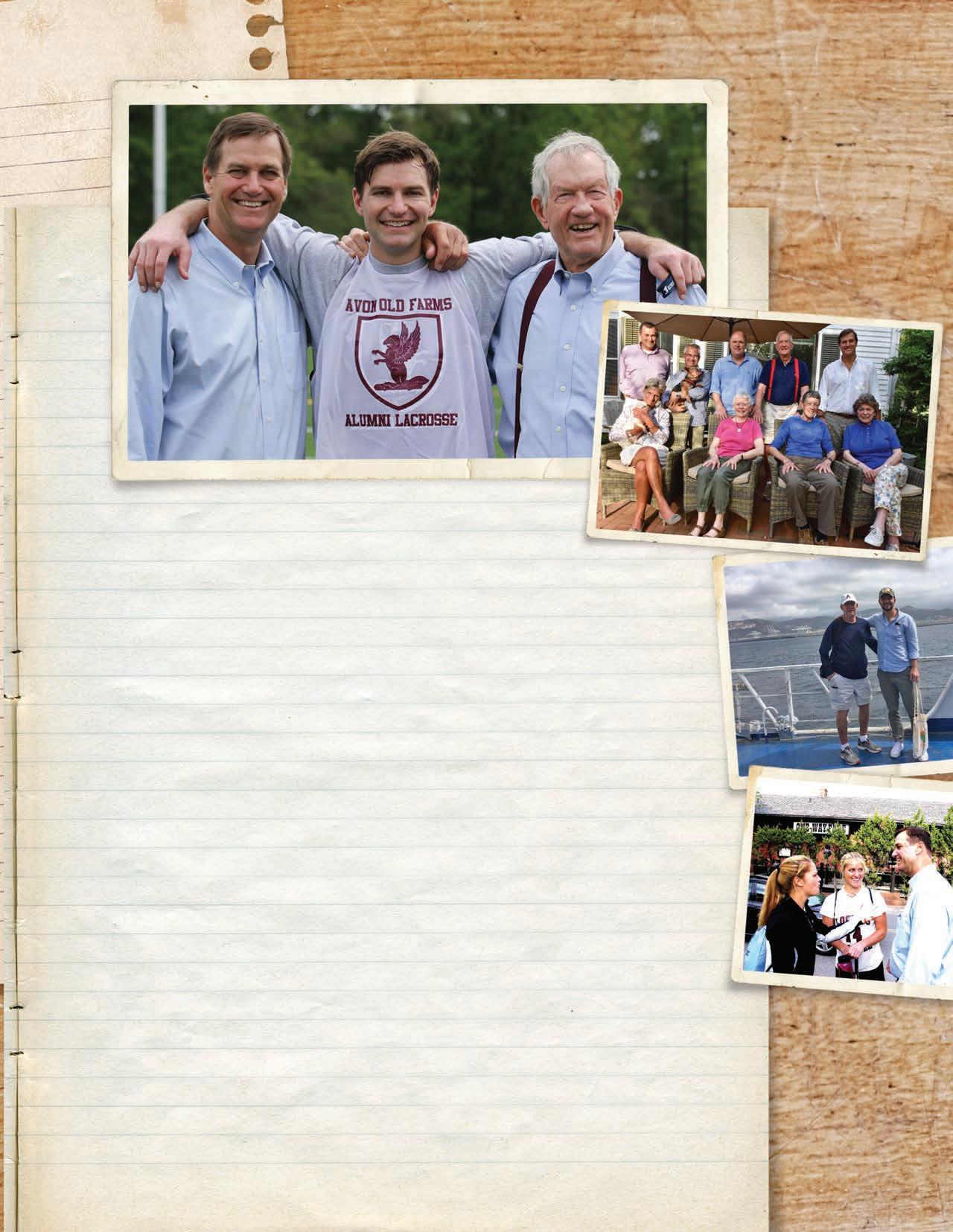
He would get stronger and seemingly younger as the trip went on. He never stopped evolving. This was arguably his most impressive quality. His intensely active mind never shut off, and he endlessly looked for ways to improve himself, his relationships with the people he loved, and everything else in his life that he felt he could effect positive change on.
When I think back on how I viewed my grandfather when I was a child, all the things I learned about him later on do not negate that perception. If anything, they further validate the authenticity of those outwardfacing qualities, the summation of which was the most complete embodiment of a gentleman that I have come across in my life so far. Although I am certainly not happy about his passing—among many other things, I will always wish (regardless of how long any of us live) that I could have more time to be on a boat in the middle of the ocean in heavy weather with him, my father, and the rest of the gang, talking about life and telling funny stories—I am at peace with it. He left nothing undone. He went out at his absolute zenith, and there is something deeply satisfying and joyful about that. I wish the same for all of you. And with that, I will leave you with George’s often used sign-off: “Good luck.”
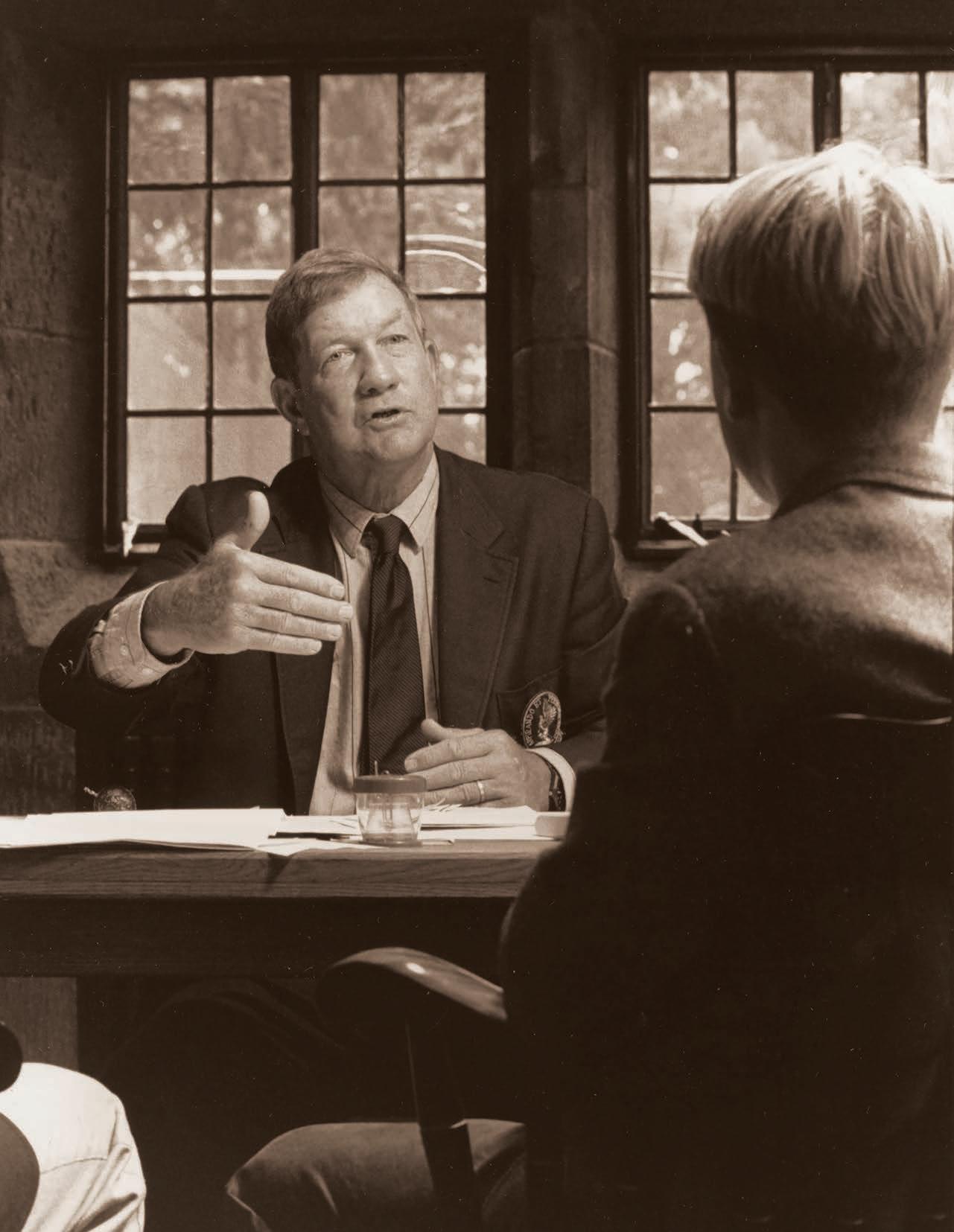
Providing an Opportunity
FOR TRAUTMAN SCHOLARS
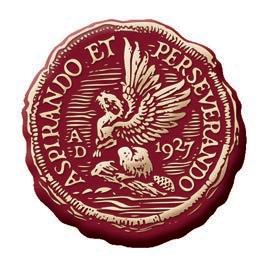
Education is priceless, and donors who support the George M. Trautman Scholarship support the educational goals and dreams of special students. Each Trautman Scholar consistently meets his promise to achieve the best of which he is capable and to be guided by integrity as he participates in activities at Avon Old Farms School. George believed this combination helps every recipient become a well-rounded young man.
The George M. Trautman Scholarship was established in 1997 in honor of George's retirement from Avon Old Farms as the school’s fifth headmaster. The fund was designed to make a lasting difference in the lives of young men, applicants Avon characterizes as intelligent, ethical, inquisitive, civic-minded, and hardworking. The scholarship is for admitted students who need financial assistance to make attending Avon possible.
To date, Trautman Scholars have taken full advantage of this opportunity. They lead at Avon as wardens and monitors, as respected students and brothers. They are often found on the honor roll, on the athletic field, and as artists performing at the highest level. They move on to competitive universities and programs. One returned home to Avon to work with the next generation of scholars. This is a special group of men, all of whom have been touched by that unstoppable brand of Trautman magic.
LEARN MORE AT
www.avonoldfarms.com/givenow/trautmanfund We hope to continue building this fund so future generations of young scholars will be afforded the same opportunity to learn at Avon and to grow as men. As you consider your philanthropy this year and in years to follow, please consider adding your contribution. Honor the Trautman legacy by making Avon possible for the next deserving scholar.
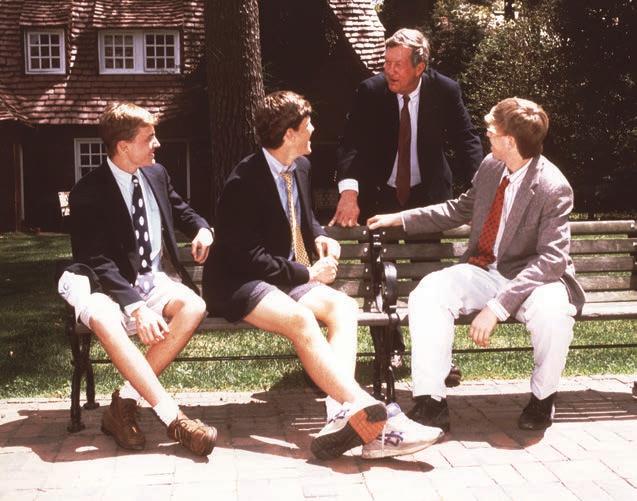
STAFF SPOTLIGHT
Debra Case
When Debra Case first set foot on the grounds of Avon Old Farms in 1976 as a high-school graduate in search of a job, she thought this place could be a part of her for a very long time. Forty-four years later, it’s safe to say that her initial instincts were true.
Deb began in the Riddle Refectory working with Avon’s dining services provider. As spring has always been a busy time at Avon, it wasn’t until May that she first encountered the true magic of the school.
“I worked graduation weekend, and it was then that I really saw what makes Avon so special: it is the combination of the architecture, the people, and the place,” Deb reflects. “Commencement wasn’t just a ceremony—it was a significant
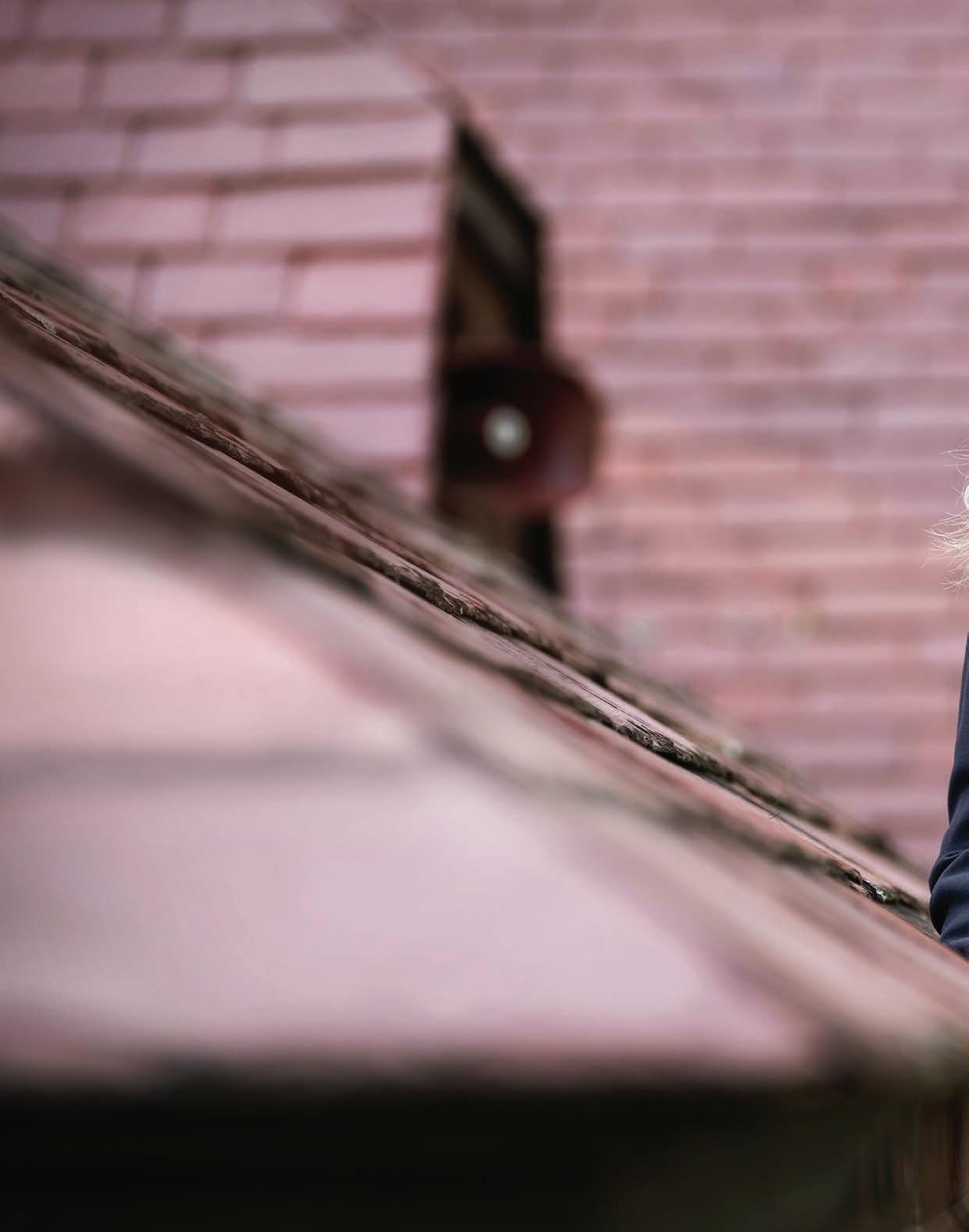
moment in the lives of everyone surrounding me.”
For so many, Avon is special. Students, alumni, faculty, and friends say it often. But for a select few, Mrs. Riddle’s quote “this place brings peace to my soul” rings true in their hearts. Deb is one of those people. For her, it’s not just the place; a big part of her Avon story revolves around the memory of George Trautman. Avon became more than an employer thanks in large part to George. For starters, he allowed Deb and her husband, Paul, to marry in the Avon chapel, which was not common at the time.
I worked graduation weekend, and it was then that I really saw what makes Avon so special: it is the combination of the architecture, the people, and the place. Commencement wasn’t just a ceremony—it was a significant moment in the lives of everyone surrounding me.
APRIL 1976
Began working at Avon Old Farms School in dining services
JULY 9, 1977
Married husband Paul Case in the school's chapel
JULY 1989
Left Avon to pursue her degree at Connecticut’s Computer Processing Institute
JUNE 1992
Returned to Avon
TODAY:
Deb is still at Avon, now in her 40th year
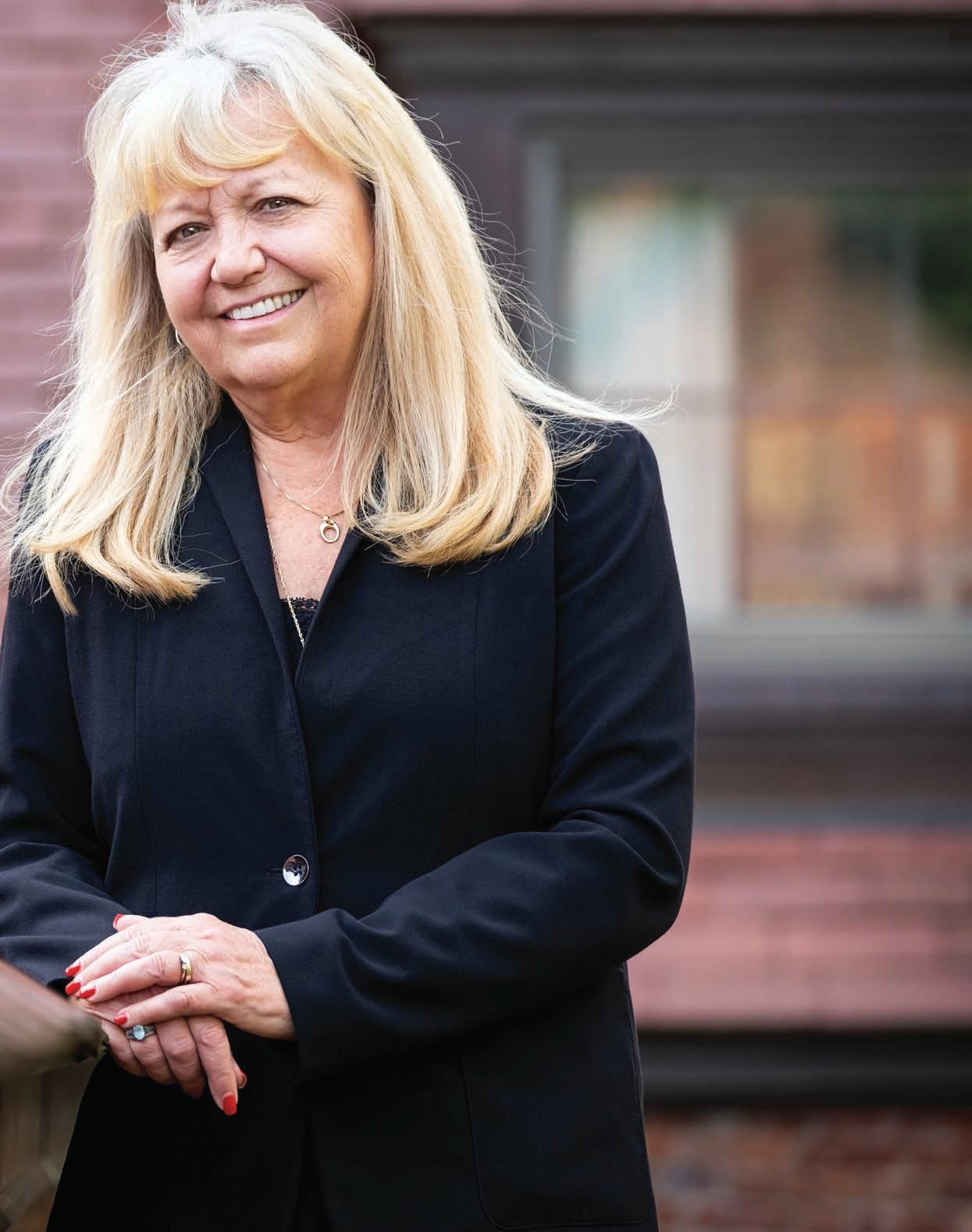
1994
Began laying plans to network the campus
JULY 27, 2002
Celebrated 25th wedding anniversary at Avon Old Farms School
JULY 22, 2006
Daughter Jessica gets married on campus
MARCH 15, 2008
Daughter Kelly gets married on campus
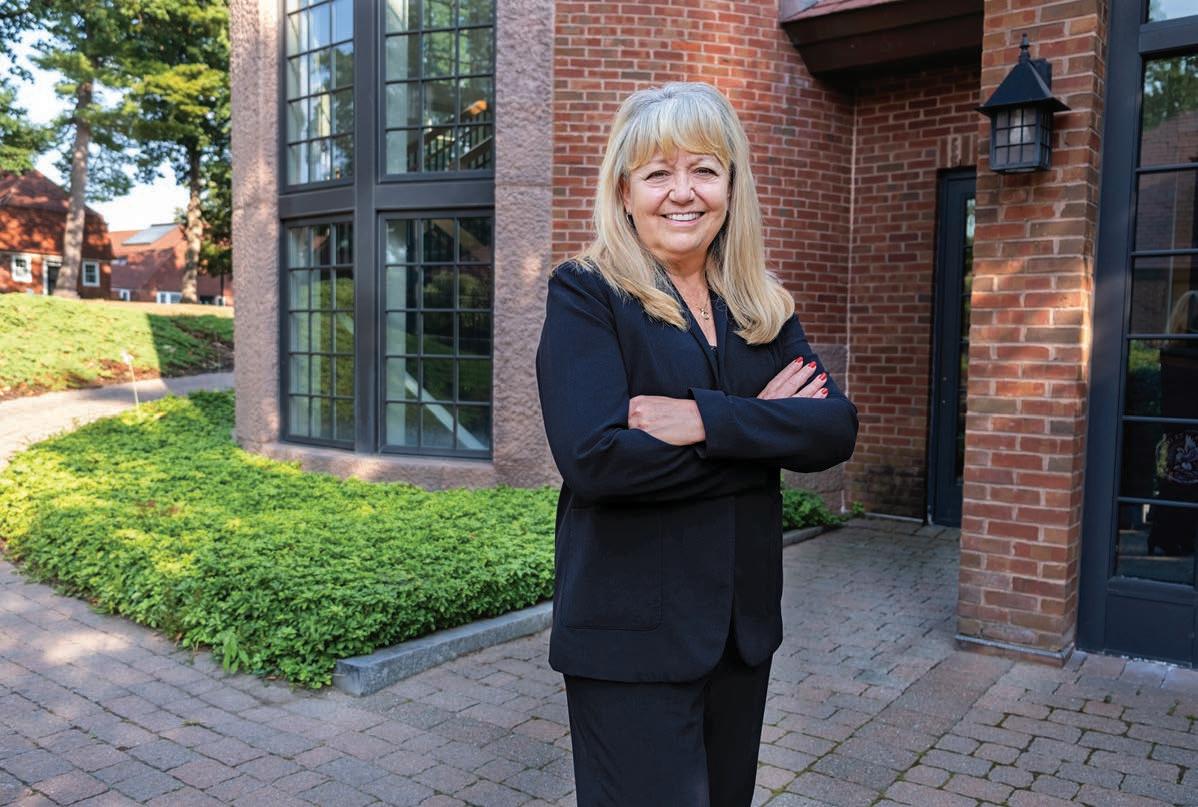
“George gave us the OK to do that,” says Deb. “It was summer, and usually Avon was completely shut down once the school year was over. To have the facilities available to us was the beginning of creating our family with Avon as our steady backdrop.”
George also made Avon a place where Deb felt comforted, supported, and able to grow.
“George was a very strong believer in people’s abilities, beyond just applications to schooling,” she explains. “George wanted to understand a person’s drive. He learned what was important to you and your life. His thoughtfulness and attention made it possible to have a relationship that went deeper than the typical employer/employee. He wasn’t the person who hired me, but because I worked at Avon, he took the time to know me, which had a huge impact on my life. He was like a father to me.”
For more than a decade, Deb worked in the refectory while George
gh
helped her gain the confidence to take on the role of director of the dining facility when the opportunity arose. However, in 1989, Deb did not believe her future was in the food service industry. During a time when computer technology was beginning to proliferate, she left Avon to enroll in classes at Connecticut’s Computer Processing Institute.
“My father was a mechanic who had his own business, so growing up, I spent a lot of time with him tinkering on things. That innate curiosity for making things work combined with a field that was just starting to get exciting seemed like a good fit. But George was a little angry at me for leaving; I think he was worried that I might not come back.”
And, for a few years, Deb didn’t. She tried her hand in corporate America and landed a job with Cigna. But she quickly found that the sense of purpose and connection she had come to love at Avon couldn’t easily be replicated. In 1992, when Deb saw an opening in dining services at Avon, she called George.
“It was one of the times I felt Mrs. Riddle was right there with us,” George Trautman said about Deb’s return in a 2004 Avonian article. “A food service director had quit. That “As a child, I spent many hours accompanying my mother to the Trautman home as she managed their technology, a new world for them. I looked forward to spending time in their beautiful home, fascinated by souvenirs they brought back from their travels, including their fantastic dog Banteng. I was always welcomed with bear hugs and great conversation. I remember how George’s voice filled every corner of a room whether he was speaking softly or with a resonant boom. He was the quintessential headmaster, with his strength, honor, and, above all, great kindness. He could have treated me like the child I was but instead conversed with me like an adult: with respect and open ears. I learned a great deal about good conversation from Mr. and Mrs. Trautman. His relationship with my mother and our family showed me the value of multigenerational friendship. My mother and George taught each other a great many things, and, I believe, became the best versions of themselves as a result. He will forever embody the concept of a leader to me and my family.”
—KELLY FOWLER
gh
very day, Debbie was in touch with me and expressed an interest in coming back to work at the school. So we got her back to run the food service and the refectory as well.”
Deb worked at Avon and continued to do some IT consulting on the side. During the busy times, George made sure that Deb knew her family was welcome on campus. They ate meals in the refectory, and George’s wife, Barbara, volunteered to watch Deb’s daughters while she worked. The girls played in the headmaster’s home, and Barbara even helped them with their schoolwork. However, Deb had returned with an understanding that she had a lot more to offer than running the refectory efficiently, and it wasn’t long until she was able to utilize her full set of skills.
In the summer of 1993, Deb arrived on campus to plan a wedding reception dressed for a previous corporate consulting meeting when she ran into Bill Kron, the dean of faculty and science teacher.
“He said to me, ‘Why are you all dressed up? It’s summer!’ When I explained where I had come from and what I had been doing, Bill asked, ‘Can you teach a computer applications class in the fall?’ That’s how I began teaching.”
gh
“Most of my memories of Mr. Trautman are of a man larger than the room around him. He loomed, not through fear or threat, but through dignity and magnanimity. When he spoke, people listened, and I sensed it at an age before I had words to characterize the effect. His care and concern for his charges and the people he counted on to help him in his mission were so sincere and thoughtful that he called upon my mom to return to the school years after she had departed, calling her up from his internal rolodex where he classified people’s strengths and called upon them to do what was right for his community. In an age of cellular data and cloud storage, his ability to find creative solutions by simply knowing people well was an art that remains appreciated.”
—JESSICA ANGELL
gh
On top of teaching, in 1994 Deb began drafting plans to network the campus. On July 5, 1995, the school selected a vendor for the network installation. By opening day that fall, miles of fiber optic cable and copper tubing had been run all over campus. By Parents Day, everything was operational. “We went from zero to 100 in three months,” Deb recaps. For most of that time, George was off campus, sailing.
“George had a lot of confidence that his people could get the job done, which built a lot of self-confidence in people. It was that type of leadership and guidance that helped me become the director of technology. When I first took over the work program in the refectory, I had to make announcements at the podium and pronounce foreign names I had no familiarity with. I thought I was completely awful. But George was literally standing right behind me at the podium that first day, and when I was done, he slapped me on the back and said, ‘Great job.’ At moments like that, I knew he would always have my back. He empowered people, and he protected them.”
Much has changed in the nearly 30 years since Deb began building Avon’s technology infrastructure, and she says that George’s openness to hearing ideas kept things moving forward.
“George always listened to ideas. Even if he didn’t agree, he knew when it was the way to go and let you lead. That was just another way that George kept Avon relevant as the world changed.”
Once more, in a fall 2004 Avonian article, George expressed great belief in Deb’s abilities: “Deb had the vision to create a technology infrastructure. Since then, as we have gone through growing pains, she has helped us to confront each of the problems one at a time. I have always appreciated her, not only for what she’s done for technology but as a person who helps to steer us on a path true to our mission. She continues as our technological architect who keeps our program up and running.” That is even more true today than it was in 2004.
Throughout it all, Deb has been proud to be a part of such change and growth while remaining true to the feeling that spoke to her that very first time she entered Avon’s campus. “Avon has given me so many opportunities, so much room for personal growth, and so much support throughout each phase of my life. I got married here, I had my 25th anniversary celebration here, both of my daughters were married here. While I’ve grown, it’s also kept me in touch with my younger self.”
This past summer, Deb was in her office in the Ordway Science Center when she learned of George’s passing. Colleagues in the room witnessed her devastation, but the outpouring of support helped ease the loss. “That day, when I shared the news with my
gh
“Mr. Trautman was always on me to call him George, but it was a difficult thing for me to do … because he was my dad’s age and, like my dad, he was a man I respected and appreciated deeply. He embodied the best of his generation; he was a leader with the strength of character into which hundreds of families entrusted the shaping of their sons’ lives. Mr. Trautman treated the staff and students like a family. He made my family part of that family and in doing so instilled in us the feeling of belonging. What I appreciate and remember him the most for is all that he did for Deb. He recognized early on the potential in her that even she didn't know she possessed. He mentored and guided, opened doors for her and supported her, gave her opportunity and made it possible for her to be the great asset that she now is to Avon. I will miss Mr. Trautman—George—and I will forever appreciate all that he was to my family.”
—PAUL CASE
gh
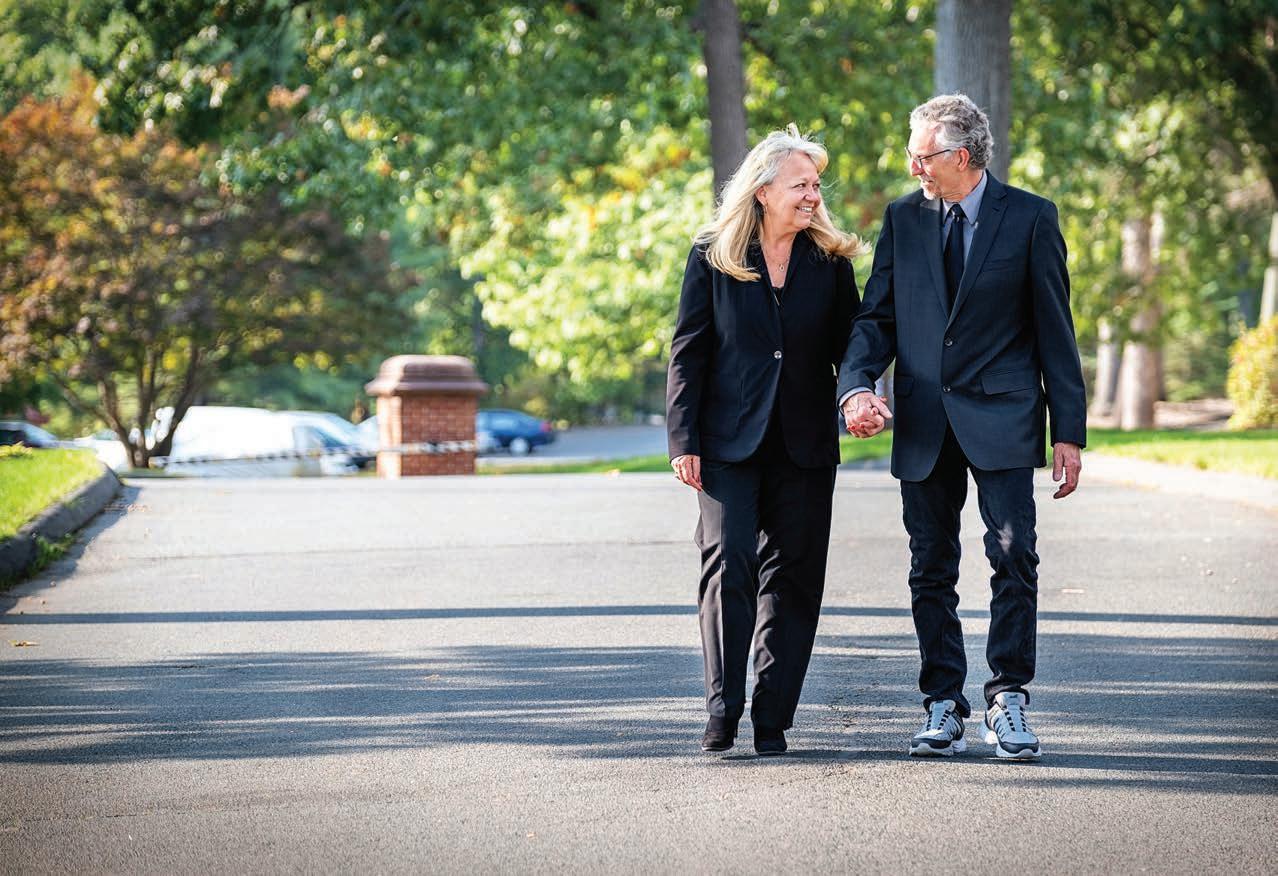
husband, he cried. Both of my girls immediately called me. When I posted on Facebook, so many people immediately knew what the loss meant to me because they knew the bond we shared. Knowing that so many people saw our connection illustrated how strong it was and let me know that I have his support even still.”
ALUMNI SPOTLIGHT
Dr. Christopher K. Hampton Jr. ’09
BY JACQUELINE KELLER
Imagine that you’re more than half way through your yearlong journey as a medical intern practicing general medicine. You live in New York City, and as the winter cold begins to fade, you are settled into your role at Brooklyn Hospital and excited to spend more time in the coming spring exploring the city with your siblings, one of whom lives less than a mile away. Then you begin to hear the word pandemic. For Dr. Christopher K. Hampton Jr., Avon Old Farms Class of 2009, that’s exactly what happened.
Chris’s journey into medicine was inspired by his grandfather, who has his own general medicine practice. In school, especially at Avon, Chris enjoyed the sciences and knew that his attraction to medicine was a career calling. He followed his father’s (Chris Hampton ’79) footsteps to Johns Hopkins University, as did his three siblings—Patrick ’10, Gerard ’11, and Bridget—where he earned both his undergraduate degree and his master’s in neuroscience.
“Early on, I fell in love with neuroscience and tissue engineering,” Chris explains. “After meeting some ophthalmologists who were very passionate about what they do and getting involved in the research, I developed a keen interest in that. Actually, it isn’t so far away from neuroscience.… When you’re performing surgery

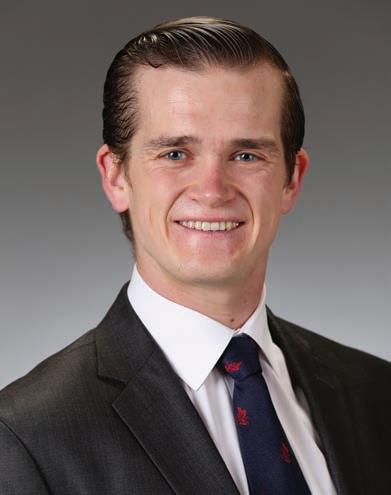
on the eye, the central nervous system is right there, and in development, the eye is really just an extension of the brain. So, for something as simple as a cataract surgery, you’re helping someone go from being blind to suddenly being able to see—it’s incredible.”
After his five years at Johns Hopkins, Chris returned to Connecticut to enroll in the UConn School of Medicine.
“It was strange to be back in Farmington of all places after being away for so many years,
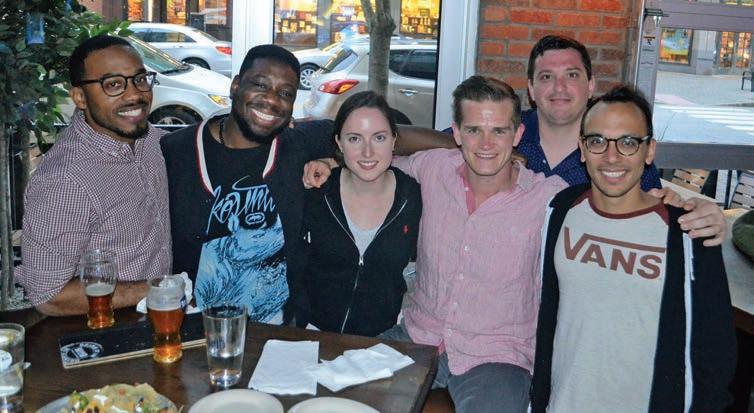
but I really enjoyed being home,” he says. After three years of medical school, Chris traveled to Bethesda, Md., to pursue a research fellowship in senior investigator Dr. Kapil Bharti’s Ocular and Stem Cell Translational Research Lab, 3-D printing blood vessels and the retinal pigment epithelium for disease modeling and drug discovery at the National Institute of Health (NIH). Chris was one of 42 students selected for the sixth class in the NIH Medical Research Scholars Program.
“This year-long research enrichment program is the starting point for a successful research-oriented career. These scholars represent some of this country’s most promising future biomedical researchers and academic leaders,” says Frederick P. Ognibene, M.D., director of the Office of Clinical Research Training and Medical Education, NIH Clinical Center, in a press release.
“I finished the fellowship and returned to Connecticut to finish medical school in the spring of 2019. Upon graduating, I was placed as a medical intern at SUNY Downstate Medical Center and its affiliates in New York City, beginning July 1, 2019,” Chris explains. “Those first few weeks on the job were
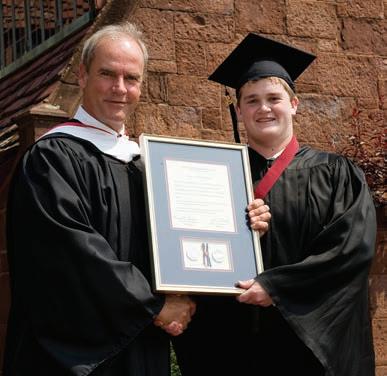
demanding. As an intern, it’s your first time practicing medicine. I was no longer a medical student observing; everything was hands-on, and I was expected to learn not only how to do all of the day-to-day things as a doctor but also learn all of the inner workings of the hospital: who I needed to know, where things were stored, how to get to the labs. As an intern, you’re a crucial member of the team with real responsibilities to care for your patients. Also, with such a large patient base, you see everything and
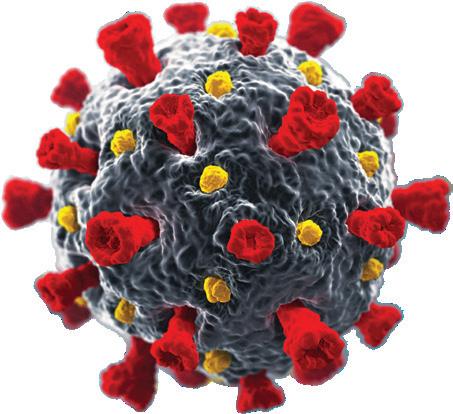
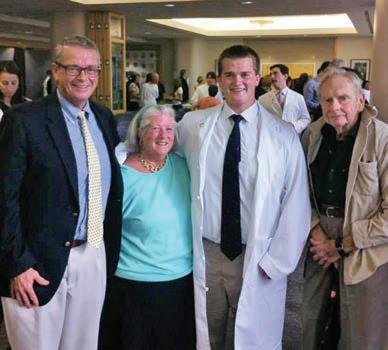
learn everything. It makes for a crazy day, but if you love what you do, it’s fun. When I was finally getting into a rhythm and feeling more at ease, the world started to learn about the coronavirus.”
At the beginning of the pandemic, when the medical community in the United States knew COVID-19 was coming, Chris says his hospital was planning its response far in advance: it created special teams and even renovated an entire wing that had been constructed originally for tuberculosis patients. The plan was to keep all COVID-19-related patients in the one wing and to provide care with a dedicated team. But, Chris says, that quickly became unrealistic.
Chris was on the hospital’s first COVID-19 team, which consisted of four people: two interns, a senior physician, and an attending. “But that was when you could count the number of U.S.-based COVID-19 patients on one hand,” he says. “We initially tried to operate mainly via telemedicine, talking to patients in the room through specially installed telephones. It was definitely scary because we didn’t know what to expect, but as we watched the graphs coming in from around the world

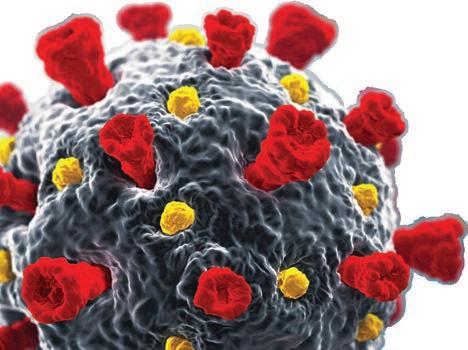
begin to surge, we knew that a major crisis would quickly be upon us.”
Suddenly the pandemic was thrust upon us all, and Chris went from treating patients who were sick in the usual ways to looking at every person as someone who potentially could have a deadly virus. The entire hospital workflow shifted from teams being dedicated to a caseload to triaging by floor and geographic space within the hospital.
“It became a lot to handle very quickly, but one thing that inspired me the most throughout the pandemic was the overwhelming sense that we were all in this together. I had a great team and could feel that we all had a common goal. No one ever said, ‘This isn’t my specialty; I’m out of there.’ Doctors and nurses flew in to help from across the country, and medical professionals of all specialties were on board to help with the COVID-19 crisis. I was so impressed with the way everyone came together.”
Chris said the most challenging part of the peak of the pandemic was the sheer volume of patients. “I would walk onto a shift and inherit so many patients that I immediately had to begin triaging, which was not the way we had been practicing medicine before COVID-19. We all knew that there were so
many needs, but oxygen levels were our primary concern. We knew there were other questions to ask and other issues to address, but with the overload of patients, it was the center area of focus. If one patient was decompensating, you had to address that then and there. Sometimes we didn’t have all of the medical supplies we needed, so we did the best we could and hoped the patient got better.”
To get through those long, hard days, Chris relied on the support of his colleagues, friends, and family. He surfed with his brother Patrick, ran two or three laps around Prospect Park near his Brooklyn apartment, and went rock climbing at Brooklyn Boulders climbing club. He was grateful to have outlets outside medicine as forms of stress relief.
“Sometimes, a patient would come in with other comorbidities, and you knew the prognosis was not good, but we did what we could to the best of our abilities, and then you had to move on,” he shares. “There was always another patient who needed more help.”
Chris said that the pace was revved up for a very long time, but then, suddenly, one day there were fewer patients in the emergency department, and it was a bit quieter. More people were being downgraded out of the ICU.
“Through it all, I’ve learned that when you’re in it and taking responsibility for a person’s well-being, you’re willing to put everything else aside. Even though the days may seem incredibly long and impossible to get through, if you love medicine and are dedicated to your patients, you make it happen. I’ve also learned to take advantage of all the time you have to be with friends and family.”
Around that time in July, Chris began his residency, also in Brooklyn, in ophthalmology. “Compared to a lot of other medical disciplines,
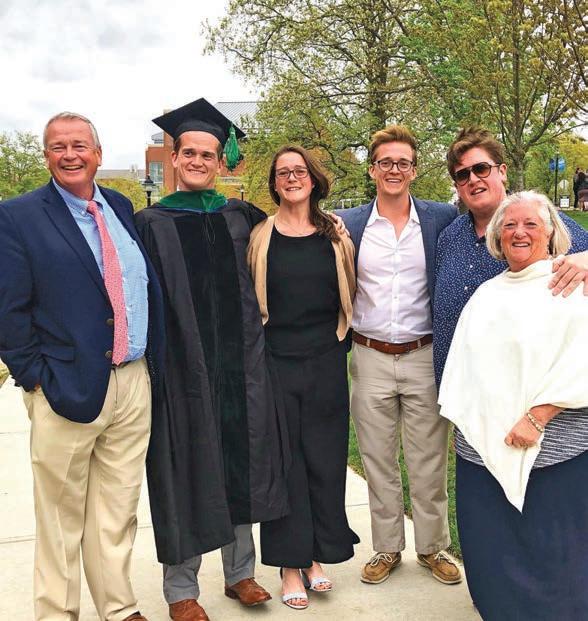
ophthalmology has a good record of being able to treat the issue and leave the patient satisfied with the result,” comments Chris. “I see a lot of patients with trauma: a bar fight, a kid who was running with a pencil. But, after seeing COVID-19 firsthand, I have been able to take a step back and address the issues one at a time. If a patient is breathing and awake, it might look like a pretty bad eyelid laceration, but you can fix that.” After his three years in residency are complete, he hopes to earn a fellowship to focus either on the retina or the cornea. But where exactly he hopes to be is less clear.
“I could see myself working anywhere, actually. I had an away rotation in Denver, Colo., which I really enjoyed. So, while it’s nice to be in New England close to my family, anywhere could be just a plane ride away.”
In the end, Chris says one thing led him through his journey: aspirando et perseverando. “You have to aspire and persevere in everything that you do. That’s a core value that lives with you forever—no matter what you do.”





